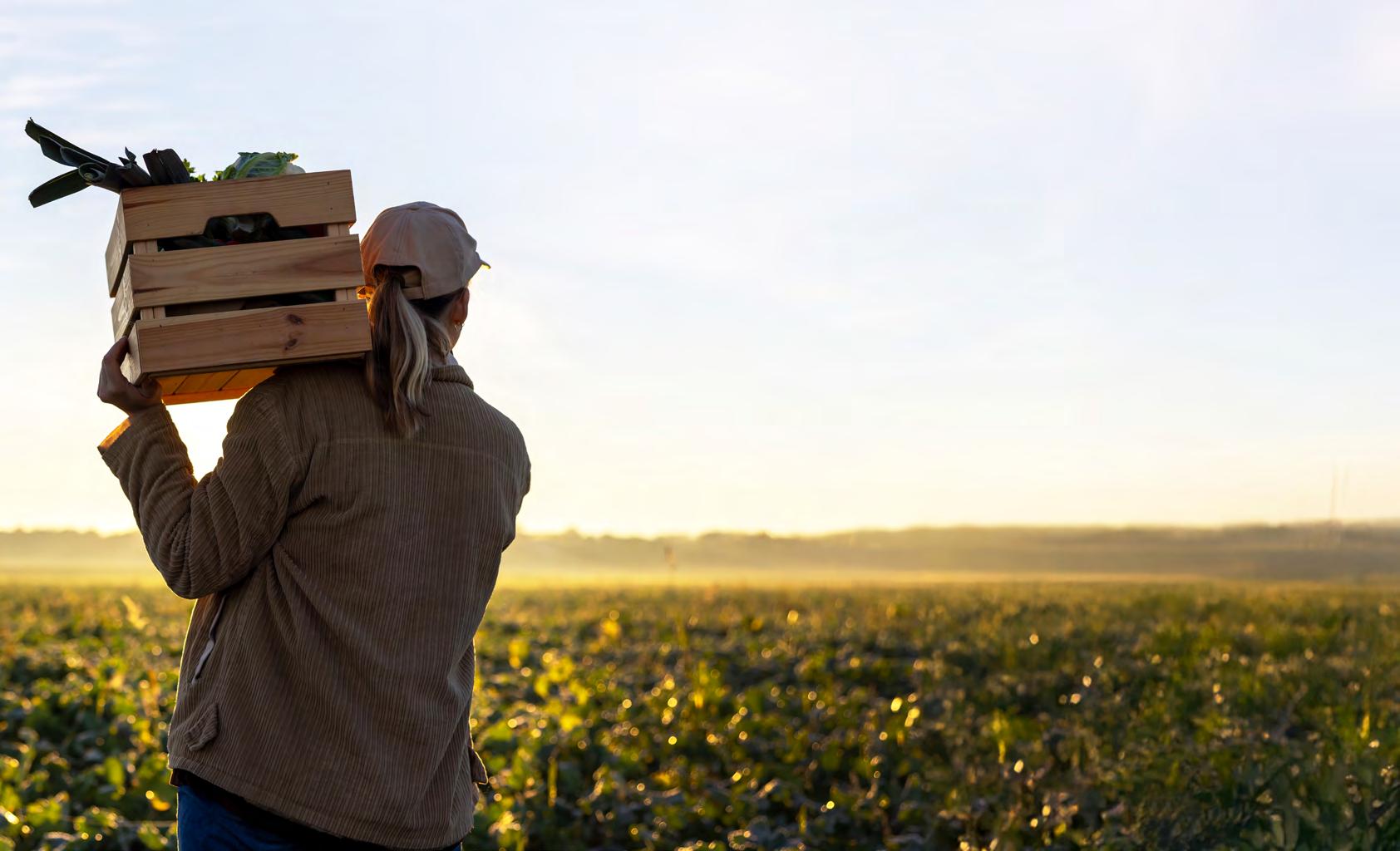






Sysco is the global leader in selling, marketing and distributing food products to restaurants, healthcare and educational facilities, lodging establishments and other customers who prepare meals away from home. Its family of products also includes equipment and supplies for the foodservice and hospitality industries. With more than 76,000 colleagues, the company operates 340 distribution facilities worldwide and serves approximately 730,000 customer locations. For the fiscal year 2024 (FY2024) that ended June 29, 2024, the company generated sales of more than $78 billion. Information about our Sustainability program, including Sysco’s FY2024 Sustainability and Diversity, Equity & Inclusion reports, can be found at Sysco.com.
$78B FY2024 global sales (3.3% vs. FY2023)
~730K customer locations
Sysco colleagues worldwide
distribution facilities
Business Segments
• Broadline
• Specialty Companies
• International Foodservice Operations
• SYGMA
• Other (Hotel Lodging Supply)
Our Purpose— why we exist:
Connecting the world to share food and care for one another.
Our Mission— what we do:
Delivering success for our customers through industry-leading people, products and solutions.
Our Identity— our role in the industry:
Together we define the future of foodservice and supply chain.
Our Values— who we are at our best:
Rooted in Integrity Committed to Inclusion
Driving Together
Define Excellence Grow Responsibly
The future of our global food systems, industry and company relies on our ability to help protect the planet’s climate and resources.
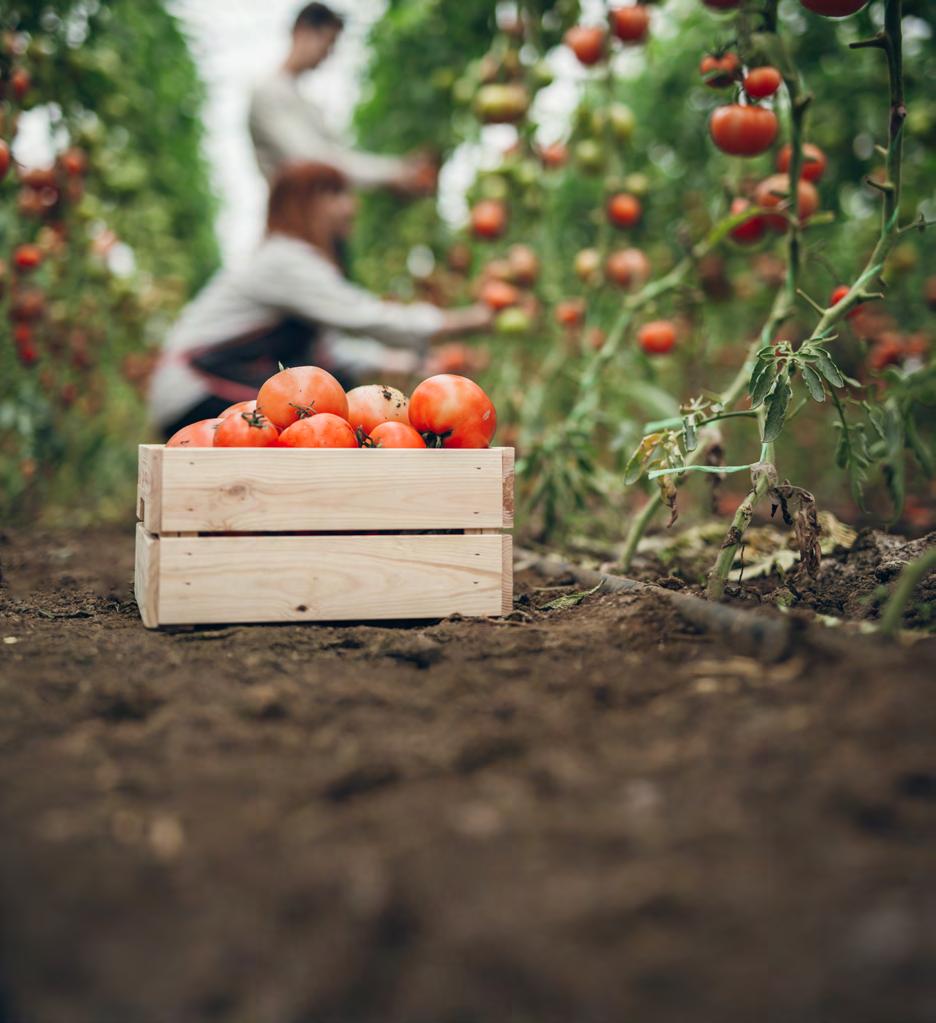
We only have one planet, and we all need to come to the table to help protect it over the long term.
Sysco is a longtime leader and a trusted partner within the foodservice ecosystem. For more than five decades, we have pursued our purpose of connecting the world to share food and care for one another. Underpinning this purpose is our commitment to model and promote sustainable practices. We know that what we do today will shape the food systems of the future.
In FY2023 we introduced our One Planet One Table sustainability platform to amplify and unite our efforts across three pillars. Within each pillar, we are pursuing specific and measurable goals, including an ambitious leadership goal where we believe we can maximize our impact.
The future of our global food systems, industry and company relies on our shared ability with our suppliers and customers to help protect the planet’s climate and resources. Sustainability has become a priority among many of our customers as they strive to meet consumer demands and achieve their own sustainability goals. We see it as an opportunity to grow responsibly by giving Sysco, our suppliers and our customers a competitive edge. Together, we can build value by delivering sustainable products, securing supply chains of the future and reducing waste and costs.
As the industry leader, we are acting on our responsibility to bring key stakeholders together so we can further embed sustainable best practices on a global scale. We’re engaging suppliers to set emissions-reduction targets; working with partners to promote more sustainable ranching, fishing and farming practices; and helping customers ensure their products are responsibly made, sourced and distributed. Our vision is to leverage our One Planet One Table platform to build value and profitable growth while maximizing our positive impact on people and the planet.
Sustainability is intrinsically linked to this strategy, touching everything from our products and supply chain to how we engage with customers and support them with digital tools. It supports our emphasis on responsible growth and is specifically connected to our Future Horizons pillar, which focuses on being responsible stewards of our company and the planet over the long term.
Robust stakeholder engagement and reporting are primary elements of our sustainability approach. View the Appendix to learn more about these processes and our material environment, social and governance (ESG) topics.
Our Recipe for Growth strategy guides us to grow responsibly and purposefully, with a focus on five pillars:
• Digital: Enriching the customer experience through personalized digital tools.
• Products and Solutions: Offering customer-focused marketing and merchandising solutions to increase sales. Introducing a cuisine-focused go-to-market approach.
• Supply Chain: Serving customers efficiently and consistently with the products they need, when and how they need them. Improved delivery performance and omni-channel inventory management.
• Customer Teams: Team-based selling that leverages Sysco’s expertise in specialty categories with a focus on important cuisine segments.
• Future Horizons: Cultivating new channels, segments and capabilities, while being responsible stewards of the company and the planet and funding the investments through cost-out efforts.
In many ways, Sysco is the backbone of a global foodservice ecosystem. Here’s how we’re leveraging our scale and position to drive sustainable transformation across the markets we serve:
Promoting responsible sourcing to enhance animal welfare, biodiversity and ecosystem health.
Defining the certifications that meet our sustainability criteria in our One Planet One Table assortment.
Assessing Sysco’s packaging and driving sustainable innovation.
Leveraging packaging- and product-related data to inform and accelerate sustainability initiatives.
PEOPLE
Engaging and investing with local, small and diverse suppliers.
Providing clear expectations to suppliers to uphold the highest standards of human rights.
Developing and promoting industry-leading sustainability standards and best practices, such as regenerative agriculture.
Encouraging suppliers to reduce their climate impacts by setting science-based targets (SBTs).
Cultivating a safe, inclusive and engaging workplace.
Providing a range of training and development opportunities to foster growth at each phase of our colleagues’ careers.
Investing in facilities upgrades, fleet electrification, and renewable energy and fuels to reduce our operational emissions.
Increasing circularity with our recycling partner, donating short-dated product and leveraging composting, anaerobic digestion and other methods to divert landfill waste.
Growing our sustainable product assortment to support our customers’ sustainability initiatives and help them stay ahead of industry trends.
Collaborating with university and industry partners to share knowledge and explore sustainable food system solutions.
Working with colleagues, customers and charitable partners to donate meals, resources and time.
Partnering on pilot programs to develop end-toend reduced-carbon food transportation solutions.
Engaging industry partners and policy leaders to advocate for expanded electric vehicle (EV) infrastructure.

3.5K+
items across 15 categories in our One Planet One Table assortment of sustainable products
~294K
megawatt-hours of renewable energy per year through a new power purchase agreement (PPA) signed in FY2024 , covering ~40% of our annual electricity needs by 2027
$1.04B
invested with Tier 1, certified diverse suppliers as of FY2024
131
EVs deployed throughout our global fleets to date, with 110 delivered in FY2024
17
fresh crops covered under Sysco’s Sustainable Agriculture program
4.3M 1
gallons of renewable diesel sourced by our sites each year, the equivalent of removing approximately 10K cars from the road2
~2.3M
pounds of plastic avoided by shifting away from single-use bottles at Gilchrist & Soames, a division of the Sysco company Guest Worldwide
6.1M
pounds of pesticides avoided through our Integrated Pest Management program 83%
waste diversion as of June 2024, up from 67% in FY2023
~17K
volunteer hours recorded by Sysco colleagues during our global Purpose Month
20M+
meals donated to help nourish communities worldwide
Since 2018, we have been pursuing key sustainability goals, most of which we aim to complete by the end of 2025 (unless stated otherwise). As of FY2024, we have already completed or exceeded several of these targets and are focused on finishing strong in the coming year.
GOAL: Establish responsible sourcing guidelines for five key commodities.
PROGRESS: ACHIEVED
Achieved two years early after establishing responsible sourcing guidelines for cocoa, coffee, paper, soy and beef.
GOAL: Ensure that all Sysco Brand protein suppliers adhere to requirements laid out in our Animal Welfare Policy for Suppliers.
PROGRESS: ACHIEVED
Achieved two years early by establishing a process to ensure all North American Sysco Brand Tier 1 suppliers provide an annual animal welfare audit and all Tier 2 suppliers provide written attestation that their raw materials suppliers adhere to our Animal Welfare Policy.
GOAL: Reduce our Scope 1 and 2 emissions by 27.5% from a CY2019 base year by the end of 2030.
PROGRESS:4
Supported Scope 1 and 2 reductions by deploying an additional 110 EVs across our global fleets, completing our Riverside, California, EV Hub, sourcing 4.3 million gallons of renewable diesel for our fleets5 and signing a PPA to increase renewable electricity at Sysco sites.
GOAL: Ensure that suppliers covering 67% of our Scope 3 emissions establish science-based targets by the end of 2026.
PROGRESS:
Sysco suppliers representing 35% of our CY2019 Scope 3 emissions have committed to setting SBTs.
We have begun a preliminary refreshment of our materiality assessment and are working to ensure compliance with new regulations as they emerge. And, we are developing new sustainability targets beyond 2025 to deepen our positive impact and keep us focused on the future.
GOAL: Ensure that all first-tier, high-risk suppliers agree to our Supplier Code of Conduct (SCOC) principles.
PROGRESS:1
Published and communicated a new SCOC to all suppliers, completed 196 Sysco Brand facility audits to ensure compliance with our standards, launched a new human rights section on our website and signed a contract to expand the use of a third-party software platform that will enable us to expand Human Rights oversight to non-Sysco brand suppliers in FY2025.
Global Good
GOAL: Generate $500M worth of good in our global communities, including 200M meals.
PROGRESS:
Generated $68M,3 including 20M+ meals as of FY2024, adding up to a total of $349M worth of good, including 123M+ meals donated to date.
1 Progress updated to reflect contract enabling third-party software to provide human rights oversight to non-Sysco brand suppliers.
2 Sysco previously published goals related to diversity, equity and inclusion (DEI) and supplier inclusion. Both goals were exceeded in FY2023.
3 Includes pledged monetary donations.
5
4 We are currently updating the way we calculate our emissions and plan to share our progress in future reports.
on
by Sysco
vendors for FY2024.
GOAL: Expand Sysco’s Sustainable Agriculture program to include five fresh crops.
PROGRESS: EXCEEDED
Exceeded our goal by including 17 fresh crops.
GOAL: Divert 90% of waste, including food, from landfills.
PROGRESS:
Improved diversion from 67% to 83% from FY2023 to June 2024 while reducing the costs of waste haulage.
A message from Kevin Hourican, Chair of the Board and Chief Executive Officer, and Neil Russell, Senior Vice President and Chief Administrative Officer
One constant in the foodservice industry is change, and this held true in FY2024. Through it all, we remained steadfast in Sysco’s mission to deliver success for our customers. Far from being an “add-on” to our business, our commitment to sustainability directly supports this work.
At Sysco, sustainability isn’t a buzzword. We are proud to lead with action and exemplify what it looks like to place sustainability at the forefront of our business. It is an integral part of our Recipe for Growth strategy, ensuring that as Sysco continues to evolve as a growthoriented, purpose-led and customer-focused company, we are doing so responsibly. This is vital for the longevity of our business and our planet. With this vision in mind, we further embedded sustainability across our business and expanded key initiatives on a global scale, supported by three main pillars:
• People—driving global good through donations of food to fight hunger, as well as promoting volunteerism in the communities we serve.
• Products—creating a sustainable product assortment.
• Planet—fostering a sustainable supply chain that removes emissions and enables our customers to meet their goals.
Investing in communities is core to Sysco’s Purpose of Connecting the World to Share Food and Care for One Another. Our Global Good Goal is to generate $500 million worth of good in our global communities by FY2025. Throughout FY2024, we focused on philanthropic and community giving priorities, including launching Sysco’s first global Purpose Month, to deliver on our promise.
Additionally, we focused our efforts inward to create an inclusive environment where colleagues thrive. From fostering engagement activities and opportunities for colleagues to grow their careers to introducing a new approach to safety, our culture is centered around supporting our colleagues’ well-being while strengthening our ability to nourish the world.
In FY2024, we collaborated with suppliers and customers to set the table for a more sustainable future.
Last year, Sysco launched the One Planet One Table assortment in our e-commerce platform, Sysco Shop. With more than 3,500 items, it is the largest assortment of sustainable and certified products industrywide. From products that
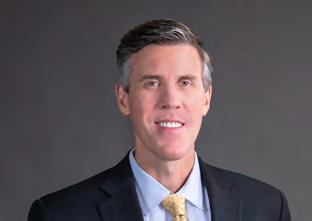

avoid plastic packaging to items sourced using low-carbon practices, the assortment makes it easier for our customers to find and choose solutions that align with their sustainability goals. And, with volumes and sales that outpaced the growth of items outside the assortment, this initiative gives Sysco a market edge.
It is not only what products we provide, but also how we source and deliver them that matters.
Understanding this, we have added 110 EVs to our North American and European fleets. In parallel, we engaged our suppliers to reduce upstream emissions, spur sustainable packaging innovation, increase value chain resiliency and more.
Progress does not happen in a vacuum; it results from many dedicated individuals working together over time.
Sysco’s purpose-driven leadership team focuses on improving today while working with our global stakeholders to transform tomorrow. We remain dedicated to leading with our strengths, both as a member of the foodservice industry and as a Fortune 100 company.
This work is ongoing, and while we’re clear-eyed about the long path ahead, we are proud of how far we’ve come. We believe our values drive value, and you will find many examples of this throughout this report. We appreciate your support and are excited to share how our vision continues to come to life.

Kevin Hourican, Chair of the Board and Chief Executive Officer
Neil Russell, Senior Vice President and Chief Administrative Officer
Fresh insights from Henry Fovargue, Vice President of Sustainability

We are seeing demand for sustainable solutions, and meeting that demand is good business.”
When you think about where Sysco has been, and where the company is going in terms of sustainability, how would you characterize FY2024?
This year was all about translating our sustainability strategy into action. We executed several large-scale initiatives and are starting to see the impact of that work add up. The numbers tell the story; we have added 110 new EVs on the road, sourced millions of gallons of renewable diesel for our fleets and helped remove millions of pounds of plastic from our supply chain. All the strategic preparation is paying off, and now we are really gaining traction.
bring more renewable electricity to our sites. Within the next three years, the solar field we are building should be able to power the equivalent of more than 26,000 homes, equivalent to 40% of our electricity at that time.
certainly supports climate action, but it aligns with our other focus areas as well. For example, we launched a Tier 2 supplier inclusion initiative to help our suppliers partner with more diverse suppliers upstream.
How have you used this momentum to further Sysco’s Scope 1 and 2 emissions reduction goal?
The efforts I described above are crucial to reducing Sysco’s emissions, and we are continually maturing our approach. We are still progressing our fleet electrification program, but now also using new levers to deepen reductions, including sourcing renewable diesel and commitment to long-term, scaled renewable energy agreements. One initiative I am excited about is the PPA we signed to
The big challenge for many companies is addressing value chain emissions, which requires a high level of supplier engagement. What did that look like throughout the year?
This is an area where we underwent a complete transformation in FY2024. Our supplier sustainability initiatives have enabled us to accelerate the growth of our sustainable product assortment, One Planet One Table, and progress our product-related goals. We recently engaged packaging suppliers and producers in a Pack-a-Thon competition that yielded amazing ideas for sustainable packaging innovation. The suggestions were not only more sustainable, but they also in many cases improved freshness, reduced damages and spoilage, or offered more competitive economics for our customers. Meanwhile, we continued to work closely with farmers and growers to embrace a more sustainable agriculture approach. Our engagement
What is Sysco’s biggest opportunity to maximize its positive impact, and how can that translate to strong business performance along the way?
One of the reasons I joined Sysco is because we’re a business-to-business company. That means we can use our position to help other companies achieve their own ambitious goals, which aligns with our values. It also leads to stronger customer and supplier relationships and, ultimately, to commercial success. We are seeing demand for sustainable solutions, and meeting that demand is good business. By embedding sustainability into our procurement processes to source products that drive progress and growth, we have taken a big step forward. The success of our One Planet One Table assortment is a great example of how we can engage our suppliers in sustainable innovation and help them think about which products can stand out and build value.
In FY2024, we drove key sustainability initiatives forward and grew our impact at scale. There are many stories demonstrating this progress throughout our FY2024 Sustainability Report. These are a few highlights that stand out across our One Planet One Table pillars:

Growing Our Portfolio with Sustainable Products
Our customers trust us to provide solutions that give them a competitive edge. One of the most important ways we’re doing that is by helping them bring more sustainable options to the table. Our new One Planet One Table offerings represent the U.S. foodservice industry’s largest assortment of products backed by best-in-class sustainability certifications, standards and programs. They empower customers to choose more sustainable options today while working toward a better tomorrow.
3.5K
products sourced across 15 categories, backed by 20+ leading sustainability certifications and standards
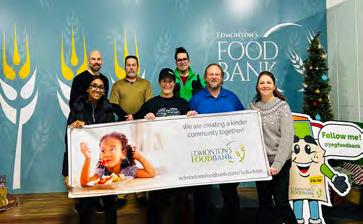
Centering Our Purpose to Do Global Good
Sysco colleagues embody the power of collective effort to make a meaningful difference. During our first global Purpose Month in November, colleagues lent their time and talent to volunteer across more than 125 Sysco sites. They took part in a range of activities, from hosting blood drives to packing community meals. These efforts significantly contributed to Sysco’s Global Good Goal of donating $500 million worth of good by 2025.
Sysco locations engaged in 500+ company-sponsored Purpose Month events, with colleagues collectively volunteering nearly 17K hours

Growing Our Industry-Leading Decarbonized EV Fleet
Sysco’s fleet is instantly recognizable in many neighborhoods worldwide. Now, our trucks are standing out in a whole new way. In recent years, we have amassed one of the industry’s largest fleets of heavy-duty and refrigerated EVs. With additional EVs deployed throughout North America and Europe, we grew the fleet significantly in FY2024. We also completed construction on our Riverside, California, EV Hub and began sourcing renewable diesel for several Sysco sites.
EVs deployed in North America and Sweden in FY2024, adding up to a total of 131 EVs in Sysco’s global fleet
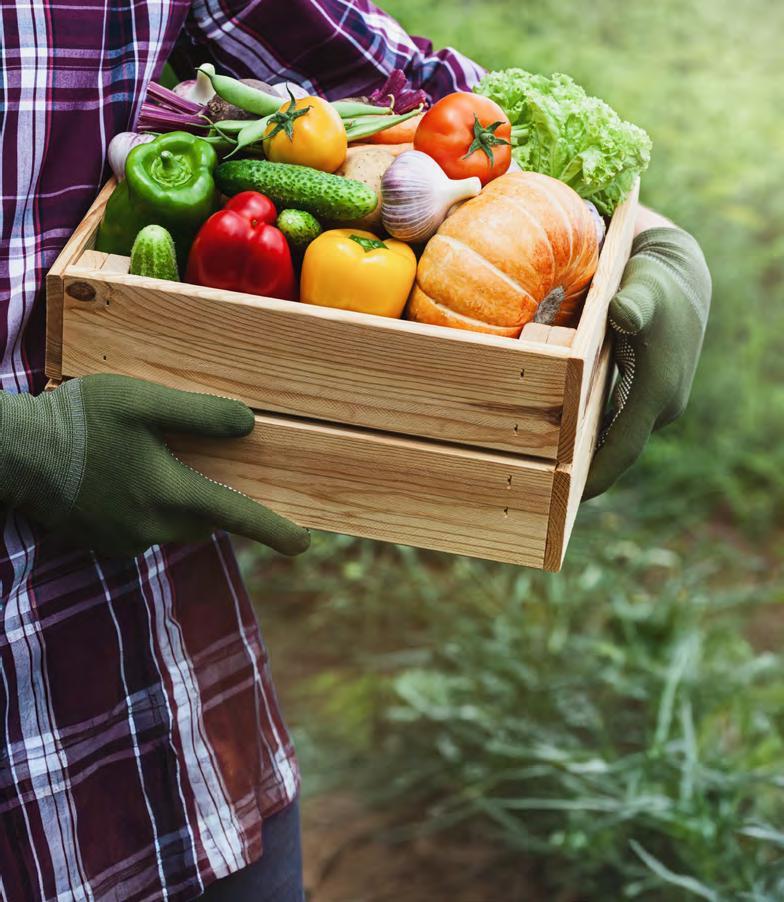
As we collaborate with suppliers and customers, we have a unique opportunity to build shared value while setting the table for a more sustainable future.
• Launched our One Planet One Table assortment of 3.5K+ items in Sysco Shop, our e-commerce platform, with growth outpacing that of items outside that assortment.
• Exceeded our 2025 coffee commitment by sourcing 36.7% of Sysco Brand whole bean and ground coffee from certified sources and 45.8% from verified responsible sourcing programs.
• Continued our participation in the Southern Plains Grassland Program, in which we’ve partnered with other members to award a total of $7.4M in grants in FY2024 to support sustainable best practices for beef production.
• Surpassed $1B in spending with certified diverse Tier 1 suppliers.1
• Established packaging guidelines for our suppliers and saved nearly 83K total pounds of corrugate by transitioning Sysco Brand exterior packaging from traditional white to kraft corrugate cases. Additionally, avoided ~2.3M pounds of plastic by shifting away from single-use bottles at Gilchrist & Soames, a division of the Sysco company Guest Worldwide.
Now Serving: The U.S. foodservice industry’s largest offering of sustainable and certified products.
The top 15 wild-caught and top five aquaculture species in our Portico Brand Seafood are part of our 2025
Sustainable Seafood Commitments. View Responsible Sourcing to learn more.

In FY2024, we were proud to officially launch our One Planet One Table assortment in our e-commerce platform, Sysco Shop. These offerings support a growing market of customers pursuing their own sustainability initiatives and goals. This increasing demand for sustainably-focused items also fuels Sysco’s business, with One Planet One Table products demonstrating faster growth of sales and volumes compared to items outside the assortment.
3,500+ products sourced across 15 categories, including items that are:
• Backed by at least one of 20+ leading sustainability certifications and standards, including but not limited to:
- Sustainable Forestry Initiative (SFI)
- Best Aquaculture Practices (BAP)
- Biodegradable Products Institute (BPI)
- United States Department of Agriculture (USDA) Certified Organic
- Rainforest Alliance
• Included in Sysco’s sustainability commitments for seafood or fresh produce.
• Plant-based alternative proteins.
Customers can access One Planet One Table items directly in Sysco Shop, where they can filter for specific sustainability criteria and access details on each item’s sustainability claims. We aim to build on these features to help more customers easily identify qualifying products. To do so, we’re focused on:
• Enhancing transparency with Sysco releasing National Sales item-level reporting on sustainability certifications and claims in August 2024.
• Upskilling our sales team by providing them with assortment-specific training and collateral.
• Partnering with suppliers to continually grow the assortment over time.

Sysco and FreshPoint fresh crops, including lettuces, broccoli and tomatoes, participate in our Sustainable Produce Program, supported by the Sustainability Food Group Sustainability Standard. Sysco SIMPLY Plant Based Barista Blends, available in oat, almond, soy and coconut, are vegan, dairy-free, lactose-free and carrageenan-free.


All baking cocoa and chocolate chip morsels in our Sysco Imperial brand are Rainforest Alliance Certified and produced under our 2025 Responsible Sourcing Guidelines.
By embracing inclusivity, we can maximize the accessibility and reach of Sysco products. With that in mind, we were proud to make Sysco Shop available in Spanish in FY2024. Learn more about how we’re promoting inclusive practices in our FY2024 DEI Report.
Our One Planet One Table Assortment increases access to items produced with our planet and people in mind.
Hallmarks of the program include:
Responsibly Sourced:
Products that align with our commitment to sustainability, ethical practices and fostering a positive social impact.
Eco Focused:
Products produced via methods that reduce environmental impacts, emphasize sustainable practices and promote biodiversity.
Designed to Reduce Waste:
Products developed with the intent to minimize landfill waste via recycling, reuse or composting.
Wholesome Farms® Imperial Cage Free Liquid Whole Eggs are American Humane Certified for production using science-based standards centered on the globally accepted Five Freedoms of Animal Welfare: freedom from hunger and thirst; freedom from discomfort; freedom from pain, injury or disease; freedom to express normal behavior; and freedom from fear and distress.


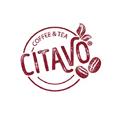
Citavo Imperial Colombian Coffees are Rainforest Alliance Certified and made from 100% Arabica beans harvested from high-altitude regions around the world. Other Citavo tiers encourage sustainability in a unique way. Citavo Classic Coffees participates in Good Grounds, which increases access to resources for socially just, environmentally responsible, and profitable farming, while Citavo Supreme Coffees are both USDA Organic and Fair Trade Alliance Certified.
Sysco FreshPoint Natural and Imperial Fresh lettuce participate in the Sysco Sustainable Produce Program supported by the Sustainable Food Group Sustainability Standard™. Participating farmers are committed to growers’ welfare and to reducing on-field environmental impacts through soil health, responsible nutrient use and irrigation management.
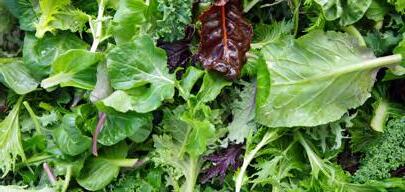

Our Earth Plus Paper Fiber Containers are unbleached and per- and polyfluoroalkyl substances (PFAS)-free. Certified by the BPI, these disposable takeout boxes meet science-based standards for compostability in industrial composting facilities.

Responsibly sourced, eco-focused products are a hallmark of our One Planet One Table assortment.
By the end of 2025, establish responsible sourcing guidelines for five key commodities.
Achieved two years early after establishing responsible sourcing guidelines for cocoa,
and
The planet’s natural resources enable us to support our customers as they feed and nourish communities around the globe.
We promote sourcing practices that help keep food systems and ecosystems intact. As we strive to responsibly source materials and ingredients, we’ve zeroed in on key commodities and sustainable seafood as areas where we can help move the needle.
We’re not doing it alone; the foodservice ecosystem is interconnected, so we take a collaborative approach to affect widespread change. In FY2024, we continued to advance responsible sourcing initiatives alongside conservation-focused customers, suppliers, organizations and industry peers. For example, we partnered with the National Fish and Wildlife Foundation (NFWF) to disperse a third round of grants through its Southern Plains Grassland Program and celebrated more than 20 years of partnering closely with World Wildlife Foundation (WWF).
Sysco is proud to be a Rainforest Alliance Certified supply chain actor. The program promotes transparency and responsible business practices throughout the supply chain. We have achieved Rainforest Alliance Certification for 100% of Sysco Brand baking cocoa and morsels. Many of our Citavo (Sysco Brand) coffee items have also achieved Rainforest Alliance Certification, enabling them to be included in our One Planet One Table assortment.
Sysco’s Indirect Responsible Sourcing team plays an important role in our work to enhance responsible sourcing practices and formed a sustainability working group in FY2023. In FY2024, the group explored various sustainable sourcing initiatives, such as investigating the potential to source more sustainable alternatives to shrink wrap and Styrofoam. View Packaging to learn more.
By responsibly sourcing key commodities, we can help mitigate pressing environmental challenges—from climate change to deforestation. We can also support the well-being of global communities and the welfare of animals that intersect with Sysco’s supply chain. In FY2023, we achieved our goal to establish responsible sourcing guidelines for five key commodities two years ahead of schedule. Building on that momentum, we furthered our progress toward key commitments for each commodity throughout FY2024.
Commitment:
As a member of the U.S. Roundtable for Sustainable Beef (USRSB) and the Canadian Roundtable for Sustainable Beef, we will actively participate in the development of principles and approaches for defining and measuring a sustainable beef supply chain and pilot a minimum of two projects by 2022 to positively impact the beef supply chain.
Progress:
Achieved by:
• Remaining an active member of the USRSB.
• Furthering our support of the Southern Plains Grassland Program, which awarded $7.4M in a third round of grants in partnership with Cargill and NFWF.
• Expanding our collaboration with Certified Angus Beef (CAB), which began as a pilot program, by providing an additional $850K to support its Beef Quality Assurance program as an exclusive partner through FY2025.
Commitment:
Source all Sysco Brand paper towels, paper napkins, bath and facial tissues from sources certified by the Forest Stewardship Council (FSC), the SFI or other equivalent standards by 2025.
Progress:
Substantially achieved by sourcing 94% of our U.S. Broadline Sysco Brand paper towel, paper napkin, bath and facial tissue case volume sold from suppliers certified by ECOLOGO, FSC or SFI.
Commitment:
By 2025, source 75% of Sysco Brand whole bean and ground coffee from certified sources or verified responsible sourcing programs.
Progress:
Exceeded by sourcing 36.7% of Sysco Brand whole bean and ground coffee from certified sources and 45.8% from verified responsible sourcing programs. This represents a total of 82.5%, up from 26.1% in FY2023.

Commitment:

By 2025, 100% of Sysco Brand baking cocoa and morsels will come from certified sources such as Rainforest Alliance or equivalent standards.
Progress:
Achieved commitment by maintaining Rainforest Alliance Certification for 100% of Sysco Brand baking cocoa and morsels.
Soy
Commitment:
Partner with our Sysco Brand suppliers and soybean industry stakeholders to identify opportunities to address the environmental impacts of soybean production in the U.S. and Canada, starting with farmers enrolled in the USDA Farm program or equivalent. Incorporate sustainability criteria in our Sysco Brand soybean oil sourcing decisions.
Progress:
Made progress by continuing to engage suppliers around soy sustainability, including by exploring initiatives related to packaging and soy fry oil, one of our highest-volume soy products.
The future of beef is about more than what’s on the plate; it’s about nurturing healthy ecosystems and delivering benefits to ranchers and animals alike. Sysco is contributing to this future through a variety of industry partnerships in the U.S. and abroad.
In FY2024, we continued to serve as a partner on NFWF’s Southern Plains Grassland Program, which supports sustainable grazing practices across 1 million acres in the Southern Great Plains. The program is a collective effort between Sysco, Cargill and Burger King, with additional support from the Walmart Foundation, Natural Resources Conservation Service and U.S. Fish and Wildlife Service. Now in its third round of funding, the program deployed $7.4 million through 15 grants to improve grassland health, support biodiversity and increase resilience throughout the region. The grants will generate over $9.7 million in matching contributions for a total conservation impact of $17.1 million. We also expanded our support for CAB’s Beef Quality Assurance Program, Raised with Respect which provides ranchers and farmers with educational resources and verifies that cattle handlers are following best practices for humane animal care. Sysco provided $650,000 in funding for the program in FY2024 and will serve as an exclusive partner through FY2025. Meanwhile, Sysco Ireland has partnered with a local rancher to operate a test farm where we are exploring regenerative and sustainable agricultural practices. View Sustainable Agriculture to learn more.

Deforestation remains a concern across the food industry, including at Sysco. In the European Union (EU), recent deforestation requirements enacted through the EU Deforestation Regulation will require companies to perform deforestationrelated due diligence. Under these emerging mandates, companies placing seven key commodities (cattle, cocoa, coffee, palm oil, rubber, soy and wood) on the EU market must verify that these products are deforestation-free and legally produced. Sysco is working to meet these standards through its EU-based subsidiaries and engaging with suppliers to support adherence to deforestation-free commodities.
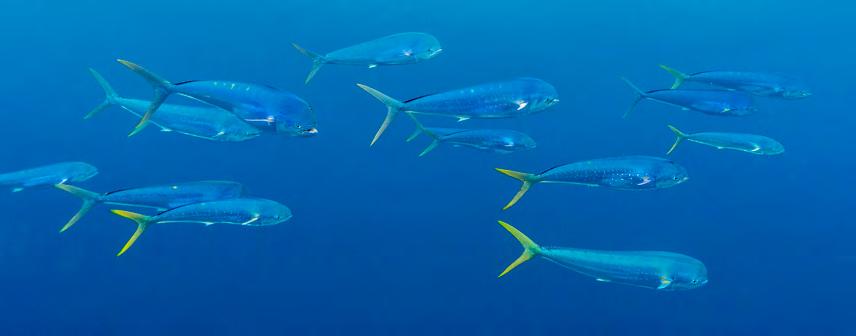
The health of our oceans goes well beyond what happens beneath the surface, playing a crucial role in environmental factors such as biodiversity and climate regulation. The impacts ripple out to nearby communities that rely on marine life for economic stability and critical nutrition. They also affect Sysco’s supply chain and our ability to continue providing the products our customers need.
Sysco has partnered with WWF for more than a decade, with our collaboration on the Peru Mahi Alliance (PMA) dating back to 2013. We were proud to see over 60% of the PMA’s FIP activities completed as of FY2024.
Overfishing, pollution and other issues can put ocean health, community well-being and the future of our industry at risk. Understanding this, Sysco has long championed sustainable seafood practices alongside partners such as WWF. For example, since 2013 we have collaborated on the Peru mahi-mahi fishery improvement project (FIP), which aims to improve the fishery’s performance to help it meet the Marine Stewardship Council (MSC) standard. This standard is something we promote, with Sysco’s business in Canada holding the MSC’s Chain of Custody certification. Over 60% of the FIP’s activities were completed as of FY2024, and our teams were proud to attend the Peru mahi-mahi industry event at Seafood Expo North America for the second year.
In addition to furthering our sustainable seafood commitments, we continued to focus on supply chain engagement and industry advocacy to build a future in which our industry, fisheries, communities and marine life can prosper. Key actions included:
• Working with a U.S. supplier of Nicaragua lobster to help the fishery move forward with the MSC certification assessment process.
• Signing a multibuyer letter organized by the WWF and nongovernmental organization Tuna Forum calling for improved tuna conservation measures by the Western and Central Pacific Fisheries Commission.
• Signing a letter to the Ecuador and Peru governments encouraging joint management of the mahi mahi fishery—a key step in advancing the FIP.
• Signing a letter with 12 other leading supply chain companies to the U.S. delegation of the Inter-American Tropical Tuna Commission Scientific Advisory Committee to encourage stronger assessment and management measures for the mahi-mahi stock.

Commitments:
• Engage with suppliers of Sysco Portico Brand farmed shrimp products to ensure supply chains are traceable to the farm’s geographic location.
• Address issues of deforestation or conversion of natural ecosystems (e.g., mangrove ecosystems and other natural wetlands).
• Work with WWF to adopt key traceability principles and build on the work of the Global Dialogue on Seafood Traceability.
Progress:
• To date, have collected nearly 800 sets of GPS coordinates across seven vendors and four countries, better enabling buyers to support mangrove restoration initiatives.
• Continued to engage suppliers to advance key FIPs where traceability is a key component of improving the management and sustainability of those fish stocks.
Commitments:
• Prohibit the sale of endangered seafood species globally.
Progress:
• Conducted risk assessments of our U.S., Canada and France supply chains to determine endangered species risks.
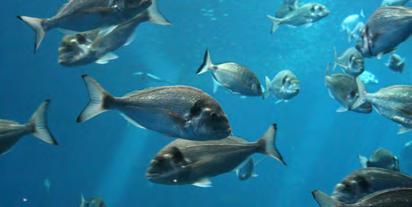
Commitments:
• Source 100% of our top 15 (by volume) wild-caught Sysco Portico Brand seafood species groups from fisheries that are MSC certified, in MSC full assessment or in a comprehensive FIP and sourcing at least 85% of this top 15 volume from fisheries that are MSC certified.
• Source 100% of Sysco Portico Brand canned or pouched tuna products from fisheries that are MSC certified, in MSC full assessment, in a comprehensive FIP or from companies that are members of the International Seafood Sustainability Association (ISSA), and source at least 25% of this volume from fisheries that are MSC certified.
• Source 100% of our top five (by volume) aquaculture Sysco Portico Brand seafood species groups from farms that are certified by the ASC, in ASC full assessment, in a credible AIP or, at a minimum, BAP 2-Star certified. Source at least 20% of this top five volume from farms that are ASC certified.
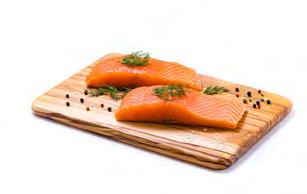
Sysco France Seafood
Commitments:
• Source 100% of top 15 (by volume) wild-caught seafood species groups from fisheries that are certified (MSC, “sustainable fishing” or Global Sustainable Seafood Initiative certified), in good stock condition (scientifically assessed) or in a comprehensive FIP.
• Source 100% of top five (by volume) aquaculture seafood species groups from farms that are certified [Aquaculture Stewardship Council (ASC), Global Good Agricultural Practices (GAP) or BAP 3-Star minimum] or in a comprehensive aquaculture improvement project (AIP).
Progress:
• Sourced 94% of the top 15 wild-caught species groups from eco-certified fisheries, fisheries in good stock condition or from comprehensive FIPs.
• Sourced 82% of the top five aquaculture species groups from eco-certified farms or from AIPs.
Progress:
• Sourced 92% of our volume for U.S. and Canada top 15 wild-caught Portico Brand seafood species groups from fisheries that are MSC certified, in MSC full assessment or in a comprehensive FIP (78% of this volume was from fisheries that are MSC certified).
• Sourced 100% of cod, pollock and haddock, our three largest species groups by volume from MSC certified fisheries.
• Sourced 100% of Sysco’s canned tuna from ISSA-participating suppliers.
• Sourced 98% of our volume for U.S. and Canada top five aquaculture Portico Brand seafood species groups from farms that are certified by the ASC, in ASC full assessment, in a credible AIP or, at a minimum, BAP 2-Star certified.
• Sourced 100% pangasius, tilapia, farmed salmon and 99% farmed shrimp (our four highest-volume aquaculture Sysco Portico Brand seafood species groups) from more sustainable sources as defined in our commitments.
• Sourced 100% of our U.S. Specialty volume for Sysco Brand wild-caught scallops and 91% of farmed salmon, our two largest species groups by volume, from more sustainable sources as defined in our commitments.
Our ability to consistently provide safe, highquality, compliant products is key to upholding Sysco’s reputation and maintaining our customers’ trust. Sysco’s Food Safety and Quality Assurance (FSQA) team designs, develops, implements and measures compliance with our food safety and quality management system, always with Sysco’s values in mind. The FSQA program covers:
• All Sysco Brand products.
• Products we manufacture in our owned facilities.
• Sysco’s distribution activities for all food products we handle.
We routinely update our audit standards to ensure our suppliers are meeting proper risk management and product quality requirements. Additionally, commodities such as raw ground beef; poultry; and ready-to-eat seafood, produce and deli meats must adhere
to more rigorous Sysco FSQA requirements designed to mitigate pathogen risks.
In FY2024, we took several steps to further enhance our food quality, safety and compliance capabilities, such as implementing real-time temperature monitoring for inbound supplier and customer deliveries. We also improved our recall communication process for our customers, enabling us to reduce the time it takes to confirm notification of market actions by 10%.
With an eye toward the future, the FSQA team evaluated new technology to improve its effectiveness and partnered with industry groups to engage key stakeholders on emerging food safety issues. The team also partnered with a third-party traceability expert and various Sysco functions to prepare for compliance with the U.S. Food and Drug Administration’s Food Traceability Final Rule, which will come into effect in 2026.

• Before being considered as a producer of Sysco Brand Products, sites must complete our comprehensive FSQA supplier approval process, in which we use documentation reviews and physical audits to verify that a supplier’s facility and FSQArelated processes meet Sysco’s standards.
• Following approval, we partner with suppliers to establish ongoing monitoring and verification procedures to ensure Sysco Brand products are manufactured and packed in accordance with agreed-upon specifications in a food-safe environment.
• To proactively identify food safety hazards in our supply chain, we conduct risk assessments for our products, processes, sites and suppliers.
• Based on these assessments, we develop preventive control programs and verification activities that we apply at our specialty company manufacturing facilities and distribution centers, and with our Sysco Brand product suppliers.
• Our Sysco-owned distribution centers, specialty processing facilities and branded suppliers must undergo annual, independent food safety certification audits to verify that they are applying industry-recognized best practices for food safety, quality and legality.
• Sysco also uses a robust internal audit process for its branded suppliers and owned companies, with more frequent audits for higher-risk suppliers.
Sysco has long advocated for independent food safety certification across all sectors of the food system. Our owned companies began working with GFSI-recognized certification programs in 2015, and over 150 of our sites are certified annually using the BRC Global Standard or the Safe Quality Foods standard. Sysco-branded food suppliers must also receive certification using a Food Safety standard benchmarked by the GFSI. The organization’s work in benchmarking and harmonization fosters mutual acceptance of GFSI-recognized certification programs across the industry and enables a simplified “once certified, recognized everywhere” approach. This reduces trade barriers and inefficiencies in the auditing process. The GFSI benchmarking process is now the most widely recognized in the food industry worldwide.

All Sysco Brand fresh, ready-to-eat produce must comply with the USDA’s GAP program, a voluntary certification program focused on continually improving food quality, safety and traceability. In FY2024, our GAP program included:
632 suppliers monitored
GAP audits conducted for our Ranch, Greenhouse and Harvest Crew groups, including facility audits for Produce


Sysco is a major provider of animal protein products and an advocate for the industrywide ethical and responsible treatment of animals.
We work closely with partners throughout our supply chain to ensure that compliant animal welfare best practices are in place. Our Animal Welfare Policy for Suppliers underpins our focus on providing positive outcomes for farm animals and details our expectations around areas including employee training and animal care. The policy covers all Sysco Brand protein suppliers for our U.S. Broadline and Specialty Meat and Seafood Group in the categories of veal, beef, lamb, pork and poultry, and our dairy, shell egg and processed egg suppliers in Canada and the U.S.
We have additional program requirements for our Sysco Brand suppliers that do not directly handle animals but purchase from supply sources that do. In these cases, we confirm that suppliers are purchasing raw materials from supply sources that meet the requirements of our Animal Welfare Policy—either through annual attestations or through reviews conducted by Sysco during routine audits. In FY2024, our FSQA team certified additional colleagues as auditors via the Professional Animal Auditor Certification Organization (PAACO). All FSQA Supplier Program Quality Managers are now PAACO certified, helping us ensure compliance with our Animal Welfare Policy for Suppliers.
Responsibly sourced products are a hallmark of our One Planet One Table assortment.
By the end of 2025, ensure that all Sysco Brand protein suppliers adhere to requirements laid out in our Animal Welfare Policy for Suppliers.
Achieved two years early by establishing a process to ensure all North American Sysco Brand Tier 1 suppliers provide an annual animal welfare audit and all Tier 2 suppliers provide written attestation that their raw material suppliers adhere to our Animal Welfare Policy.
We are committed to ensuring that high standards and practices for animal welfare are consistent throughout our supply chain.
We believe that the humane treatment of animals within our supply chain is the right thing to do. It builds customer confidence and supports further growth and development of the foodservice industry.
We serve a wide variety of customers with different needs. We are committed to providing animal protein products that meet these needs while maintaining our standards for animal care.
We support species-specific, science-based animal welfare standards and encourage ongoing continual improvements with our suppliers of animal proteins.
We work with suppliers who demonstrate a commitment to aligning with our requirements and do not tolerate violations due to supplier negligence.
We consider food safety, environmental, societal and economic impacts—as well as internal and external stakeholder input—as we implement our animal welfare policy.

As animal welfare legislation continues to evolve throughout the U.S., we have collaborated closely with our suppliers and evolved our product assortments to ensure compliance. This legislation includes (but is not limited to) various cage-free egg laws, Massachusetts Question 3 and California’s Farm Animal Confinement Initiative (previously known as Proposition 12).
To support compliance with California’s Farm Animal Confinement Initiative, we registered our California-serving distribution centers with the state authority to enable them to market products covered by the rule. Ten out of 16 of our sites have also completed compliance audits to verify that they meet the legislation’s requirements. The remaining sites have scheduled audits, which will be completed by the end of 2024, as required under the law. We also have encouraged federally inspected suppliers to become certified under the law.
A majority of our supplier-owned farms for Sysco Brand Fresh Pork in the U.S. have adopted group housing systems. We continue to work with our pork suppliers to ensure compliance with all state and federally mandated regulations.
One of our focus areas for animal welfare is sourcing cage-free eggs and ensuring compliance with related state-level requirements. As of FY2024, cage-free eggs represented approximately 33% of all shell and processed/liquid egg orders fulfilled in the U.S., a yearover-year increase of 1.1% (cases) or 1.6% (pounds). They also represented 9.6% of cases fulfilled in Canada and 13.35% of the country’s shell and processed/liquid egg sales. We are proud to have achieved compliance with cage-free-egg legislation in several states. However, we have moved away from our focus on sourcing cage-free eggs exclusively by 2026, based on limitations related to supply, demand and inflation.

When we work with suppliers who embrace sustainability, we can grow faster together. Throughout the years, Sysco has cultivated a robust supplier network. Today, we are focused on leveraging these relationships to enhance the well-being of people, animals and the planet. In an increasingly regulated and globalized business environment, these efforts help our company and suppliers mitigate risks and ensure compliance. They also create opportunities to build mutual value by delivering the sustainable solutions our customers need and want.
We believe this is important and want to partner with suppliers who align with our commitments and values. Our supply chain is large and varied, so effective engagement relies on a tailored approach. In FY2024, Sysco’s Sustainability Sourcing efforts have accelerated this work by transforming our supply chain and business already, from driving packaging innovation through our first-ever pack-a-thon to engaging more than 500 attendees during our second annual Supplier Summit.

In April 2024, Sysco celebrated Earth Week by hosting our second annual Supplier Sustainability Summit. During the live, virtual event we discussed how we can collaborate to support customers and drive growth—all while increasing food supply chain resiliency and protecting the future of the planet.
The summit included presentations from Sysco’s senior leadership, members of our Sustainability team and others from areas across the business. They emphasized key areas of opportunity, including climate action, sustainable products and packaging, and regenerative agricultural practices.
The summit also included break-out sessions on other focus areas, such as our work to build supplier inclusion. We closed the event by providing related resources and calls to action to further our engagement and work.
We know that sustainability is going to be a competitive advantage for us, and it can be a competitive advantage for our suppliers. These are opportunities that we all have to make an impact across every point of the food value chain.”
VICTORIA GUTIERREZ Senior Vice President and Chief Merchandising Officer at Sysco

Our supplier relationships touch many aspects of our business, meaning we have a breadth of opportunities to drive mutual progress and growth. These are a few of the strategic levers we’re using to enhance sustainability.
Suppliers play a critical role in helping us reduce Sysco’s Scope 3 emissions, which are generated by our value chain activities. One of our primary focuses is working with suppliers to help them reduce their emissions by setting science-based targets. View Energy and Climate to learn more.
Our One Planet One Table sustainable product assortment is helping us deliver for our customers while driving business growth. We’re engaging suppliers to share in that growth and have their products featured to customers by achieving third-party sustainability certifications.
View One Planet One Table Assortment to learn more.
By increasing the recyclability and sustainability of our packaging, we can help reduce value chain emissions and waste, including from materials such as single-use plastics. We’re challenging suppliers to support these efforts by focusing on sustainable packaging innovation. View Packaging to learn more.
Regenerative agriculture is a high-impact way to strengthen ecosystems while reducing a product’s lifecycle emissions. We’re working with farmers and ranchers to explore these practices as they grow and raise the products we supply for our customers. View Sustainable Agriculture to learn more.
Enhancing supplier inclusion is part of Sysco’s strategic sourcing approach. We continue to engage diverse suppliers and support them in achieving certification and are proud to have surpassed $1 billion in total diverse Tier 1 supplier spend.1
View our FY2024 DEI Report to learn more.
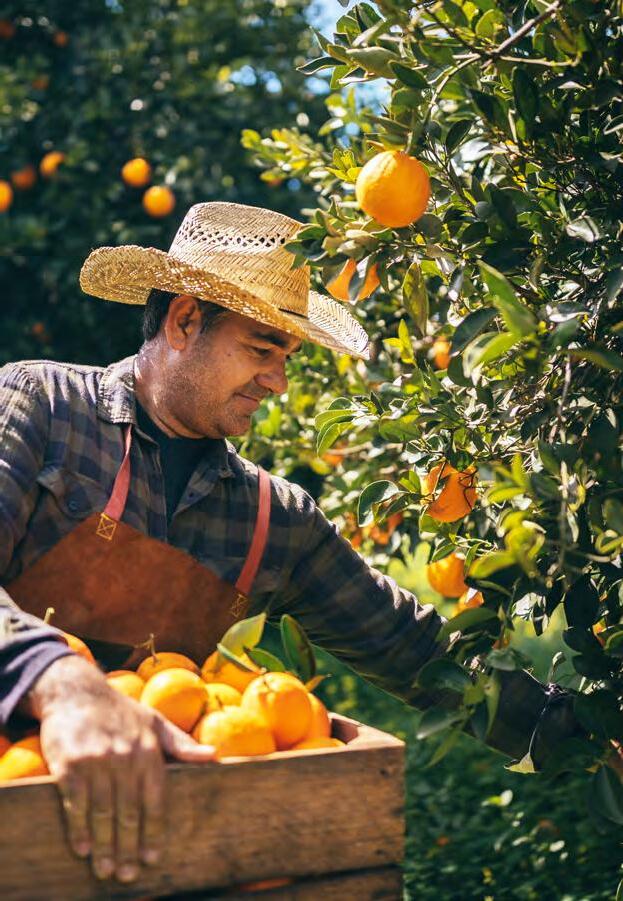
We believe all people deserve to work in a safe environment with fair treatment and equal opportunities to succeed.
Our work to uphold human rights is integral to Sysco’s value of growing responsibly and critical to mitigating supply chain-related risks. We expect all suppliers to uphold the highest standards of human rights, as detailed in Sysco’s Supplier Code of Conduct (SCOC), and to adhere to the International Bill of Human Rights and the International Labour Organization’s Core Conventions.
Sysco’s commitment to preserving human and labor rights is far-reaching. For nearly 15 years, Sysco has implemented an industry-leading
Social Responsibility Program that, among other things, requires all suppliers that produce Sysco Brand products in high-risk countries, including Asia, Latin America and Africa, to undergo third-party annual audits. In FY2024, we created a cross-functional team to review our strategy and processes with an aim to help ensure we can continue to address human rights risks as the industry landscape evolves. We also published a new SCOC that we communicated with all suppliers, including our specialty companies, and launched a new human rights website
Sysco has zero tolerance for any act of human trafficking, slavery, forced labor or child labor. Should these issues be identified, our approach is to promptly address them in compliance with our policies and procedures. View our website to learn more about how we manage these issues through our Social Responsibility Program.
By the end of 2025, ensure that all first-tier, high-risk suppliers agree to our SCOC principles.
Published and communicated a new SCOC to all suppliers, completed 196 Sysco Brand facility audits to ensure compliance with our standards, launched a new human rights section on our website and signed a contract to expand the use of a third-party software platform that will enable us to expand Human Rights oversight to non-Sysco brand suppliers in FY2025.
Among other things, Sysco’s Social Responsibility Program requires suppliers that produce Sysco Brand products in high-risk countries, including Asia, Latin America and Africa, to undergo third-party annual audits. On the rare occasion of a safety-related travel restriction, we may also use virtual audits. Our auditing process enables us to proactively identify potential risks relating to wages, working hours, discrimination, worker safety, living conditions and child and forced labor.
Should a risk be identified, we will work with Sysco Brand suppliers and processors to develop and implement improvement plans. The consequences for suppliers where critical issues are identified during the audit are serious and may include suspending or canceling our agreement for them to pack Sysco-branded products. Sysco has and will stop purchasing products from companies that do not comply with our SCOC. In FY2024, 43% of audited suppliers improved their scores, and five locations were suspended from working with Sysco based on their audit results.
audits conducted in FY2024 in 18 countries, including 53 initial audits of new and approved facilities
Through our focus on continuous improvement, we took several steps to enhance our Social Responsibility Program in FY2024, including the following initiatives:
• Created a cross-functional team to review our program strategy, options and approach.
• Published and communicated an updated SCOC to all suppliers.
• Launched a new human rights website.
of audited supplier locations improved their scores compared to their previous audits.
• Ensured regulatory compliance by publishing Sysco Canada’s FY2023 Forced and Child Labor Disclosure and a U.K. Modern Slavery Act Transparency Statement, which are publicly available in Sysco’s online document library.
facilities achieved perfect audit scores
• Piloting a program to expand the use of a third-party software platform that enables us to review and analyze supplier audits across our business and gain increased access to information on suppliers that are not subject to our Social Responsibility Program.
• Enhancing accountability throughout our supply chain by expanding the timeframe in which unannounced audits may occur from within 21 to 90 days.
By shifting to more sustainable packaging, we can curb value chain emissions and help tackle the challenges of plastic waste.
Effective packaging serves an essential function in the food industry by keeping products safe and fresh. This is key at Sysco, where many of our products need to withstand an additional point of transport, with suppliers shipping products to our warehouses that we then distribute to our customers. However, many forms of packaging also contribute to global plastic waste, which has increased by more than 11% since 2021.1
footprint. We also engaged suppliers around these topics during our Pack-a-Thon challenge and our Supplier Sustainability Summit. Internally, we furthered a project to analyze our high-plastic packaging categories, creating a foundation for future progress. We aspire to use these insights to inform our long-term packaging roadmap and an overarching sustainable packaging goal.
The bath and body brand Gilchrist & Soames, a division of the Sysco company Guest Worldwide, is working hard to minimize plastic waste. Through the company’s ongoing initiative to transition customers to large-bottle formats, it avoided the use of more than 185 million single-use bottles—equivalent to nearly 2.3 million pounds of plastic—in FY2024. This represents an increase of more than 16.7 million avoided single-use bottles, or more than 206,000 pounds of plastic, compared to FY2023.
This level of waste generation is unsustainable for our planet, so Sysco is taking action by identifying short- and long-term opportunities to drive sustainable packaging and material innovation. We use minimal cosmetic packaging compared to retail sellers, giving us added opportunities to explore various materials and configurations. Many of our products also require larger amounts of packaging than retail items, so even a small shift in our design can add up to a meaningful difference.
In FY2024, we established packaging guidelines for our suppliers, who determine most of our packaging content, to encourage them to transition to materials and design principles that will collectively reduce our environmental
Packaging Materials by Type2

Primary packaging:
Directly contains the final product, helping to preserve and protect it while providing information to consumers.
Secondary packaging:
Serves as an exterior layer for primary packaging and is used to carry and store a specific quantity of each product.
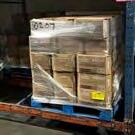
Tertiary packaging:

Used for storing and transporting large quantities of products, often via pallets and wrapping.
Our work to increase sustainable packaging at Sysco is a long-term endeavor. Here’s how we built momentum in FY2024:
we’ve taken
• Established guidelines for our suppliers’ primary and secondary packaging, outlining materials and practices to discontinue, transition, maintain and accelerate.
• Began transitioning Sysco Brand exterior packaging from traditional white to kraft corrugate cases, enabling up to 30% energy savings, up to a 17% material reduction and increased recyclability.
• Collaborated with suppliers, customers and Fresh Direct, our produce business in Great Britain, to begin transitioning berries to FSC-certified paper packaging that will eliminate over 50 tons of annual plastic waste.
• Introduced new buffet boxes for fresh produce at Fresh Direct, made from 62% recycled cardboard, which are fully recyclable and use less material. This enabled us to remove five tons of virgin cardboard from our supply chain per week and achieve over 1,000 pounds of carbon savings per year.
• Launched FreshPoint Produce without Plastic offerings by working with suppliers to find sustainable alternatives for items that would typically be packaged in plastic clamshells or bags.
• Building our ability to gather more packaging material data, which will be key to establishing a packaging sustainability baseline and comprehensive goal.
• Leveraging our new Sustainable Sourcing team to explore initiatives for more sustainable shrink wrap and Styrofoam seafood containers.



To support our goal of implementing more sustainable packaging across our supply chain, we hosted Sysco’s inaugural One Planet One Table Pack-a-Thon in FY2024. The event presented a unique opportunity for Sysco suppliers and packaging producers to showcase their innovative packaging solutions and be recognized for their important work.
We prioritized primary packaging solutions aligned with key innovation categories, including reducing virgin plastic, increasing the use of recyclable and compostable materials and replacing single-use packaging with returnable or reusable alternatives. Suppliers and packaging producers from all categories were welcome to participate and submit proposals for Sysco Brand items and other existing solutions.
Sysco’s senior leadership selected the top 10 proposals, with the finalists participating in a pitch competition to earn opportunities to explore joint development with category leaders and product exposure. The winners included:
• Superior Foods’ bio bags, a compostable bioplastic alternative to traditional food-storage bags made of polyethylene designed for use with frozen foods.
• Cargill’s biodegradable beef packaging, 100% biodegradable shrink bags that break down into organic components up to 98% faster than beef packaging in anaerobic environments like landfills.
• PA and PulPac’s blister packs, which use dry molded fiber to reduce plastic in single-use items and enable water and energy savings.
Through Sysco’s Recipe for Sustainability program, we are collaborating with top universities to explore innovative, cost-effective solutions to food and packaging waste. After launching the program with students from Arizona and Pennsylvania in FY2023, we expanded the program to include students from North Carolina; Toronto, Canada; and London and Exeter, England, in FY2024. Key initiatives included exploring partnership strategies to divert and upcycle food waste and using biodigesters to minimize waste downstream. View our FY2024 DEI Report to learn more about how we’re engaging universities in inclusive educational opportunities.

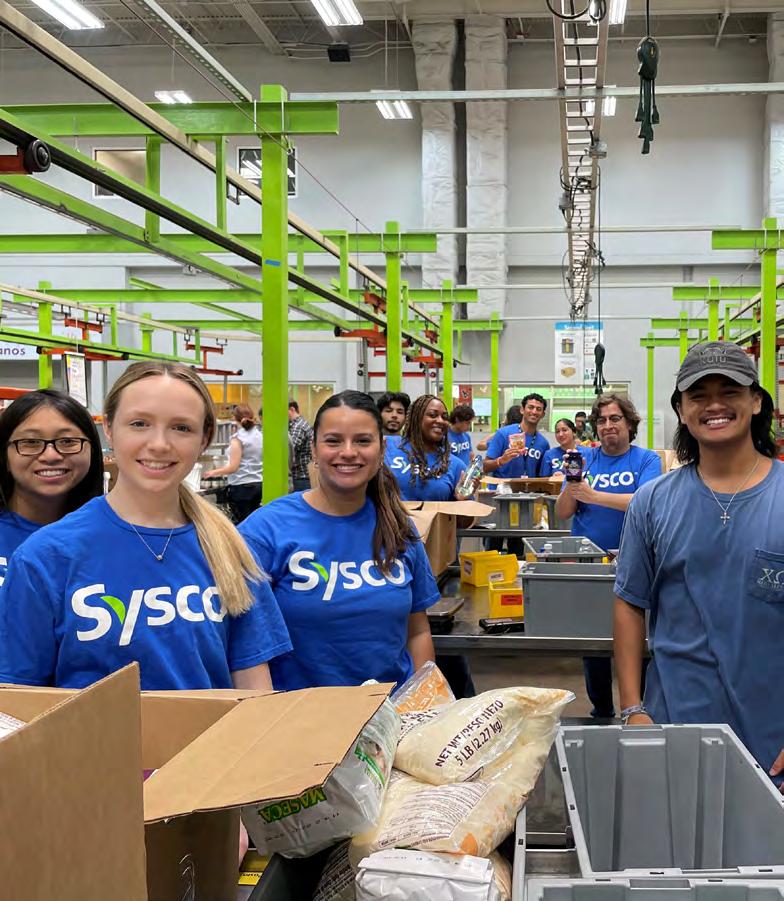
We care for the people around Sysco’s table by creating a safe, engaging and inclusive workplace and by nourishing communities worldwide.
• Recorded nearly 17K volunteer hours by Sysco colleagues at 125 locations during our global Purpose Month and 36K+ volunteer hours in total during FY2024.
• Achieved our highest Sysco Speaks survey participation rate at 88%.
• Increased representation of women in Sysco’s global workforce and of colleagues who are women, Black/African American, Hispanic/Latino or two or more races among U.S. people leaders year-over-year (YOY).
• Saw 28% YOY growth in our Supply Chain Internship cohort and completed the first full year of Sysco’s Future Leaders Program.
• Evolved our safety strategy to focus on preventive and proactive tactics, leading to over a 13% decrease in worker’s compensation claims and a decrease in auto liability claims of more than 8%
Investing in communities is core to Sysco’s purpose of connecting the world to share food and care for one another.
We lend time, expertise and resources to give back to the communities where we operate. In FY2024, this work included coordinating global volunteer efforts for colleagues, partnering with customers to donate unused food products and continuing long-standing collaborations to end hunger.
Our philanthropic and community giving priorities include:
Feed: We are committed to nourishing our communities. Partnering with local organizations, we provide healthy, nutritious meals and donate food to alleviate hunger for families facing food insecurity.
Serve: We are active stewards of our communities. Our colleagues volunteer their time with organizations advancing causes that are important to them, including fighting hunger and food waste.
Give: We are supporters of the people making a difference in increasing access to food. This includes giving funds and aid to organizations working on hunger relief at a local, national and global scale.
By the end of 2025, generate $500M worth of good in our global communities, including 200M meals.
Contributed $68M1 worth of good, including through 20M+ meals, as of FY2024, adding up to a total of $349M worth of good, including 123M+ meals donated to date.
1 Includes pledged monetary donations.
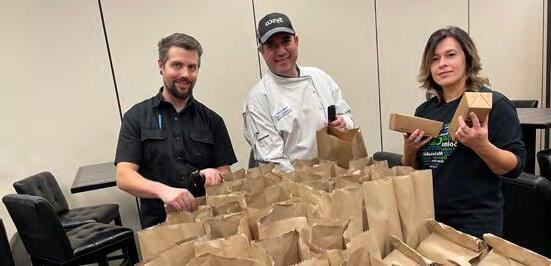
The generosity and dedication of Sysco colleagues is clear. Each year, we acknowledge their contributions to local communities through the Sysco Gives Back volunteer recognition program. Colleagues can log their volunteer hours using our Volunteer Hour Tracker, and we analyze this data to provide the following acknowledgments and awards:
Our Volunteer of the Year program recognizes colleagues who log the most volunteer hours and awards them with a $1,000 donation to the charity of their choice. Our FY2024 winners included:
• Volunteer of the Year: Amy Frenchmeyer (U.S.)
• Top International Volunteer: Susan Yates (Canada)
• Top Hunger-Focused Volunteer: Sourabh Bhatia (Canada)
We also recognized Angela Barcheers and Kristina Manuel as runners-up for Volunteer of the Year and awarded them $500 each to be donated to the charities of their choice.
The Sysco Company of the Year award recognizes the Sysco site that best represents our company’s purpose and includes a $10,000 donation to a hunger-focused organization in the winning site’s country. In FY2024, we honored Sysco Winnipeg for the second year in a row after colleagues at the site collectively logged over 1,500 volunteer hours.
It’s amazing to see the positive impact our teams can make when we come together to put our purpose first.
This is something we strive to do year-round at Sysco, and it came to the forefront in November 2023 as we celebrated Purpose Month globally for the first time.
Purpose Month began as an initiative of Sysco Canada, with over 1,000 volunteers participating in FY2023. Seeing the success of that event, we decided to expand Purpose Month to include Sysco colleagues worldwide.
During FY2024, Sysco colleagues volunteered for their own causes and participated in over 500 companysponsored events. Colleagues participated at more than 125 locations, including in the U.S., Canada, Sri Lanka, Ireland and the U.K.
The events included opportunities to pack meals for hunger relief, pack amenity kits, host blood drives and write cards for military care packages. Sysco awarded sites with the highest participation rates and volunteer hours per colleague with a donation to the hunger-focused charity of their choice.
~17K
hours volunteered by colleagues during our first global Purpose Month
125+ participating Sysco locations
500+ company-sponsored Purpose Month events
This is an important time of year for food banks and other organizations as they gear up to support our community through the holiday season. Together, we contributed significantly to Sysco’s Global Good Goal of donating $500 million worth of good by 2025.”
NEIL RUSSELL, Senior Vice President and Chief Administrative Officer at Sysco
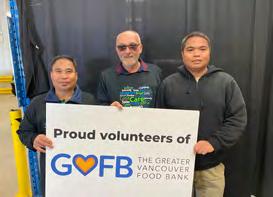

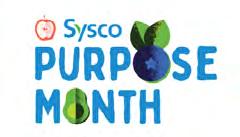


We are proud to partner with our customers to help alleviate hunger worldwide. This can occur when a customer makes significant menu changes or closes a business, in which case we often partner with them to donate unused or unneeded products. In FY2024, we facilitated the donation of more than 20 million meals, helping our customers feed communities and reduce food waste.
20M+
meals donated by Sysco in FY2024
In FY2024, colleagues in the U.S., the U.K., Sri Lanka and Ireland joined Sysco Canada in celebrating Purpose Month on a global scale. Across 125 locations, Sysco colleagues participated in volunteer service projects, including packing meals and amenity kits, hosting blood drives and assembling care packages for those in the military.
Sysco has long supported organizations working to eliminate global hunger. For example, FY2024 marked 25 years of our partnership with Share Our Strength’s No Kid Hungry campaign. Our support includes providing in-kind contributions at No Kid Hungry events. We also continued to partner with Feeding America in the U.S. and over 40 charitable partners in Canada. We plan to build on this work through our revitalized One Planet One Table Foundation in FY2025.
36K+
total hours volunteered by Sysco colleagues in FY2024
$17M+1
total funds donated by Sysco in FY2024
We are so grateful for the dedication and remarkable efforts of the Louisville Fire Department and all the first responders who aided in rescuing our delivery partner from the Clark Memorial Bridge. Their unwavering bravery not only saved our colleague’s life but also demonstrated their commitment to protecting the safety of their community every day.”
CHRIS JASPER, Senior Vice President of International Americas at Sysco

A routine delivery day turned into anything but that for Sysco truck driver Sydney Thomas in March 2024. When a pickup truck struck Thomas’ semi-truck on the Clark Memorial Bridge in Louisville, Kentucky, her semi-truck veered off the bridge’s guardrail, leaving Thomas stranded inside the cab and dangling over the Ohio River. The Louisville Fire Department came to the rescue, with firefighter Bryce Carden rappelling down to the cab to bring Thomas to safety.
We later honored the department’s heroism with a donation of over 1,500 pounds of food and kitchen items to fill two firehouse pantries. To further our support, Sysco provided a $20,000 contribution during the department’s annual award banquet. We’re incredibly grateful for the bravery and skill of Louisville’s first responders in keeping our colleagues and communities safe.
To remain an industry leader in people, products and solutions, we listen to our colleagues—and we act on their insights.
Hearing from Sysco colleagues firsthand is essential to creating a workplace where people feel valued, respected and motivated. In FY2024, we further invested in a robust engagement and action strategy to support our colleague and organizational growth. This included redesigning our listening strategy to focus on targeted input from our regional and functional pulse surveys, Colleague Resource Group events, and Sustainability and Better Together Town Halls.
We also worked to build consistency in how we operate, train and communicate with frontline colleagues across our sites. For example, we standardized our paid time off policy and saw a 20% improvement in retention across four sites after six months. Building on this success, we plan to expand this work to more sites in the U.S., Canada and Europe in FY2025.
We continued to deploy Sysco Speaks, our annual colleague engagement survey, to gather feedback from colleagues around the world. We use these survey insights to guide our strategies and improve our colleagues’ experience year after year. In FY2024, we saw a survey participation rate of 88%, the highest in Sysco’s history. We also achieved an overall engagement index of 78%, representing a YOY increase of 1%.
In FY2023, colleagues identified their ability to feel heard and maintain a healthy work-life balance as areas where Sysco could improve. We were proud to see key indicators of progress in FY2024, including YOY increases in colleagues who said:
• They are able to discuss concerns with their immediate supervisors.
• Supervisors take action when concerns are identified.
• They are able to report unethical practices.
• They are comfortable voicing different opinions.
• They maintain a healthy work-life balance.

Colleague responses by the numbers: 88%
understand how their role relates to Sysco’s purpose 83% believe Sysco’s teams are committed to our customers 82% are comfortable addressing their concerns with their immediate leader 80%
agree that Sysco provides a healthy, safe and secure place to work 80% agree that their immediate leader shows a commitment to inclusiveness
Key strengths
Our colleague responses ranked above the industry benchmark in key areas:
• Colleagues want to stay at Sysco.
• Colleagues are committed to highquality customer service.
We remain focused on the following areas moving forward:
• Enacting positive changes in response to our Sysco Speaks survey.
• Enhancing teamwork across Sysco functions.
We’re creating an inclusive culture—within and beyond Sysco’s walls—to strengthen and support our colleagues, communities and business.
We can achieve better results when we bring diverse perspectives and experiences to our business, and when we provide equitable opportunities for career growth. We are specifically focused on building inclusion across our organization. Our vision is to ensure that everyone has a seat—and a voice—at Sysco’s table. In FY2024, we enacted year two of our three-year “Better Together” DEI roadmap, which guides our DEI initiatives across three areas.
Our Workforce:
We work to attract and retain diverse workforce talent while ensuring that people can move equitably through Sysco’s systems.
Our Workplace:
We focus on creating an environment that makes people want to come to Sysco and stay.
Our Marketplace:
By focusing on DEI within our workforce and workplace, we can better meet our stakeholders’ needs.
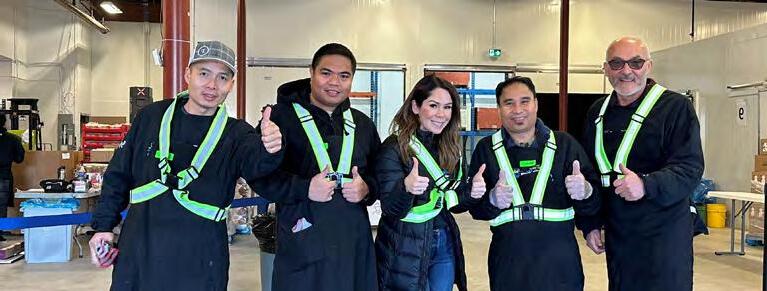
View our FY2024 DEI Report to learn more about the progress we’ve made in making Sysco more equitable, inclusive and diverse.
At every step in our colleagues’ professional journey, we strive to support them in identifying and reaching their career goals.
This includes providing programs and support to help colleagues develop their leadership capabilities, earn new certifications and build new skills. When we invest in our colleagues’ growth, we create an environment where they want to stay, and we make our business stronger over the long term.
Throughout FY2024, we continued to offer programs and initiatives that support our colleagues at each step of their careers.
Sysco’s 10-week paid internship program enables U.S. college students to gain real-world experience while exploring potential careers. This includes our Supply Chain Internships, which we revitalized in FY2024 to enhance inclusion and engagement. We welcomed 32 Supply Chain interns across 10 sites, growing the cohort by 28% from FY2023. Supply Chain interns hired for full-time positions at Sysco can join our
Future Leaders Program, where they receive additional training and guidance to develop their leadership skills. We completed the first full year of the 40-week program in FY2024, with seven participants, many of whom were previously Supply Chain interns, transitioning into or completing the program during the fiscal year. With another 15 participants on track to transition into or complete the program in FY2025, we are excited to see this program’s early growth.
Sysco’s Operations Academy provides supervisors, delivery partners and warehouse selectors (colleagues who select, package and ship our products) with opportunities to deepen their skills or earn new, role-related certifications. In FY2024, we added training time
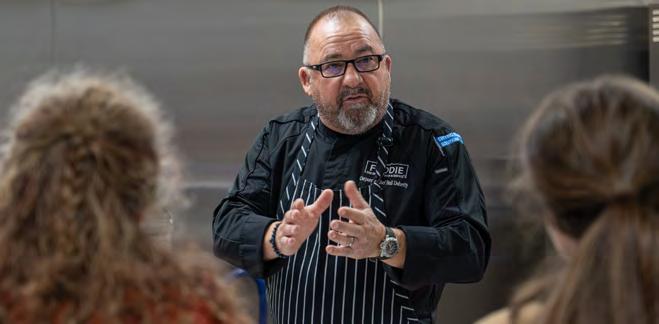
to our Selector Basic Training and extended it to colleagues at SYGMA, Sysco Canada, Sysco Bahamas and European Imports. We also updated our Delivery Partner Basic Training to streamline training schedules and allow for more behind-the-wheel practice, and we expanded these opportunities to all sites in Sysco Canada and Sysco Bahamas.
In FY2024, we welcomed 10 cohorts to our Supervisor Onboarding program, with 146 new frontline leaders completing the training and achieving an average retention rate of 95%. We also reinstated our Navigator Strengths and Leadership programs, which help develop Sysco leaders into agile and top-performing professionals.
6,600+ warehouse selectors and 4,000+ delivery partners trained in FY2024
Sysco’s Sales Consultant Onboarding Program now focuses on customer outcomes and how sales colleagues take responsibility for their success. In FY2024, over 1,300 new sales colleagues participated in this program, with each presenting a quarterly plan for progress in their respective territories upon completion.

“Safety Is Our Main Ingredient” for a healthy workplace. We aim to send colleagues home to their family and friends safely, each and every day.
To achieve that, we are working to standardize safety practices and frameworks across our operations. This was a focus throughout Sysco in FY2024. During that period, we found opportunities to further socialize workplace safety policies and procedures, while recognizing the role-specific risks that come with various jobs. These efforts helped us begin to build a more unified safety program while reducing injuries and accidents compared to FY2023.
Our colleagues were key to this progress, as we empowered them to help us develop a more proactive and preventive safety approach. We engaged them through internal initiatives and campaigns, including a competition to create Sysco’s new safety brand.
This ongoing work supports Sysco’s ambition to build a culture that centers our colleagues’ health and well-being, while strengthening our ability to nourish the world.
Listening to and acting on colleagues’ insights was a core factor in enhancing our safety strategy in FY2024. In our Sysco Speaks survey, Sysco colleagues shared safetyspecific insights that we plan to address in future initiatives. We also created a new feature in our intranet that allows colleagues to log safety best practices or concerns, helping us further engage colleagues while capturing an up-to-date snapshot of our safety performance.
To make these efforts more visible and tangible to colleagues, our Environment, Health and Safety leaders visited sites and hosted fireside chats to explain our strategy and address colleagues’ questions. We also piloted our new Safety-Hyper Care program at select sites to boost colleagues’ safety awareness. The program enables us to reward safe behaviors and incorporate safety into our day-to-day operations. In addition, we have since seen a 9.9% YOY reduction in related safety claims at Hyper Care sites, including over a 20% reduction in claims for worker’s compensation.
As we matured our safety strategy, we introduced key Safety Ingredients across our sites in FY2024. They include overall best practices, as well as role-specific non-negotiables that help protect colleagues from pertinent risks.
We also leveraged technology to more proactively identify and prevent risky behaviors or situations. For example, we added cameras to many of our fleets to help us identify potentially unsafe driving behaviors and evaluate the potential for driving incentives. We also began using artificial intelligence to determine the riskiest areas of our warehouses and develop better ways to alert and protect our colleagues.

To bolster our safety strategy, we emphasize colleague health and well-being in many of our campaigns and initiatives. For example, in FY2024, we brought athletic trainers to select sites to educate our warehouse and delivery colleagues on injury prevention. This also helped us introduce basic stretches and exercises that colleagues can incorporate in their daily routines. Other initiatives focused on topics such as the importance of a healthy diet, regular exercise and adequate sleep. We also broadened our well-being benefits in FY2024 by adding or updating the following offerings:
• Employee Assistance Program
• Behavioral Health Benefits
• Digital Well-Being Coaching
• Rethink Care (child and parent mental health resources)
• Headspace (app-based mental health resources)
For All Colleagues:
• Stop Work Authority
• Accident/Incident Reporting
• Emergency Preparedness
• Walking, Working or Slippery Surfaces
• Personal Protective Equipment
• Distracted Driving and Impairment
Additional Ingredients for Warehouse and Production Colleagues:
• Hazardous Work
• Safe Equipment Operation
• Property and Equipment Damage
Additional Ingredients for Driving Colleagues:
• Defensive Driving
• Safe Driving
• Backing Up—Get Out and Look
• Scan Ahead and Practice Zone Safety
TAKE IT FROM OUR COLLEAGUES:
To create a workplace that protects all Sysco colleagues, we enlisted their help, creating a contest to come up with a tagline that captures the essence of our safety approach. More than 7,000 Sysco colleagues in 30 countries submitted their ideas. We selected “Safety Is Our Main Ingredient” as our winner, as it reflects the foundational aspects of Sysco’s business and safety commitment. Colleagues also selected a safety mascot named Shellbert. The contest allowed colleagues to think creatively about how safety factors into their day-to-day roles—and why it is our main ingredient in success.
View our FY2024 DEI Report to learn more about our approach to providing inclusive resources and benefits.
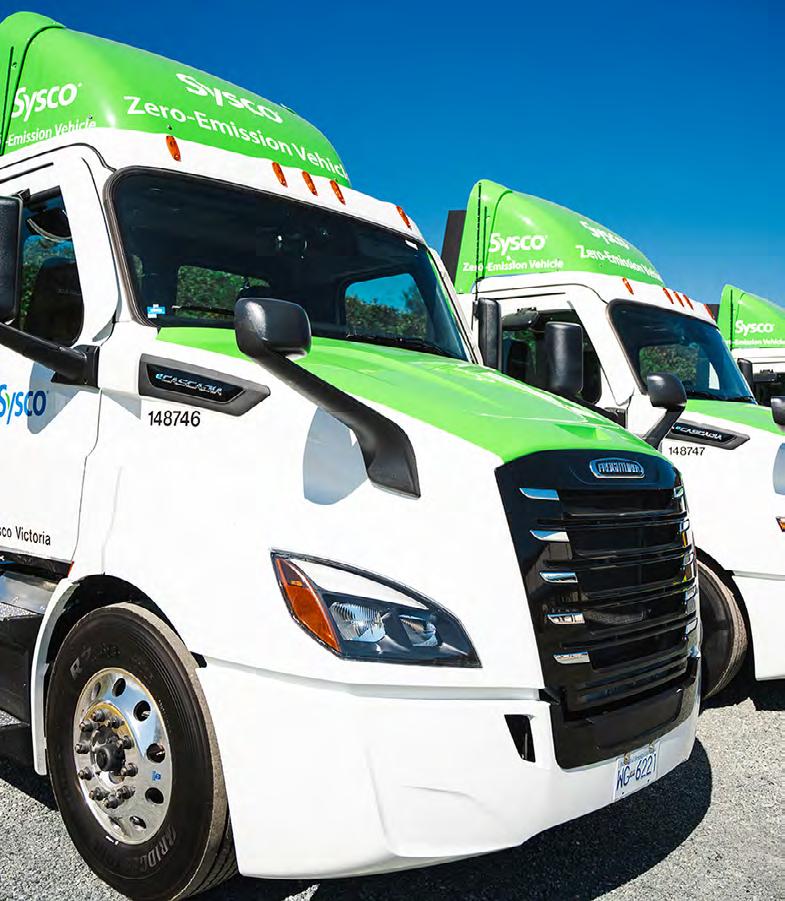
We have only one planet, so we’re enhancing all aspects of our business to help protect it, from our global facilities and fleets to our sourcing standards.
• Deployed an additional 100 electric vehicles (EVs) across North America and 10 in Sweden.
• Sourced 4.3M gallons of renewable diesel for Sysco’s fleets.1
• Completed our Riverside, California, EV Hub.
• Signed a power purchase agreement (PPA) that will accommodate 40% of our annual electricity needs when it is completed in 2027.
• Expanded Sysco’s Sustainable Agriculture program to include a total of 17 fresh crops.
• Made progress on our waste goal, improving diversion from 67% to 83% from FY2023 to June 2024. 1
The future of our planet and industry hinges on what we do to reduce emissions today. At Sysco, we understand the urgency of the situation—and we see reason for hope.
Over 4,000 companies, including many from the food industry, have set science-based targets (SBTs) for emissions reductions.
Sysco is among these companies, becoming the first food distributor to set SBTs in 2021. These targets are critical for climate progress, as food supply chains produce more than a third of global greenhouse gas (GHG) emissions.1
Our climate strategy aligns with the Paris Agreement and includes emissions-reduction goals for Scopes 1, 2 and 3. These goals are approved by the Science Based Targets
Reduce our Scope 1 and 2 emissions by 27.5% from a CY2019 base year by the end of 2030.
2
Supported Scope 1 and 2 reductions by deploying an additional 110 EVs across our global fleets, completing our Riverside, California, EV Hub, sourcing 4.3 million gallons of renewable diesel for our fleets3 and signing a PPA to increase renewable electricity at Sysco sites.
1 World Wildlife Fund, “Engaging in the Food Supply Chain:
2
3
initiative, ensuring they are in line with best practices based on the latest climate science. Value chain (Scope 3) emissions are our largest carbon contributor; however, they are not in Sysco’s direct control. As we work to address these, our approach is to lead by example in reducing our operational (Scope 1 and 2) emissions while engaging value chain partners to do the same. By focusing on fleet decarbonization, renewable energy, supplier engagement, sustainable agriculture and more, we continued to make strides in FY2024.
Ensure that suppliers covering 67% of our Scope 3 emissions establish science-based targets by the end of 2026.
Sysco suppliers representing 35% of our CY2019 Scope 3 emissions have committed to setting SBTs.
Sysco’s value chain is expansive, making it challenging to capture detailed emissions data. However, this is now possible thanks to several new technology platforms that we began implementing in FY2024. These tools have enabled Sysco to establish a preliminary baseline for our U.S. emissions, including product emissions, and will support the development of an overall emissions baseline moving forward.
We now have three platforms working in harmony to deliver accurate emissions measurement, tracking and reporting. Together, they enable us to:
• Calculate the emissions of our food products.
• Measure our carbon footprint and plan reduction initiatives using artificial intelligence.
• Simplify the environmental, social and governance reporting process to support compliance.
We plan to achieve full implementation and integration of these tools in FY2025. They will be critical in helping us:
• Ensure compliance with emerging regulations.
• Provide the emissions and other sustainability data our customers require.
• Identify the most efficient path to achieving our sustainability goals.
Sysco has created one of the largest and most geographically diverse fleets of heavy-duty EVs throughout the U.S. We see this work as a key opportunity to reduce transportation-based emissions by embracing electrification. Not only does this help us curb our carbon footprint, but it also reduces noise pollution and improves our delivery partners’ day-to-day experience.
In FY2024, we continued to expand our EV infrastructure and fleets, both internationally and throughout the U.S. Several sites shifted toward renewable diesel, further supporting our goal of reducing operational emissions by 27.5%. We also continued to pilot end-to-end food transportation solutions and engaged our community and industry partners during our Fleet Forum and other events. We’re excited to lead in this new and evolving space and remain focused on the road ahead.
BY THE NUMBERS
4.3M 1
gallons of renewable diesel sourced by our sites in FY2024, the equivalent of removing approximately 10K cars from the road2
131
EVs total deployed across our North American and European markets to date, with 110 delivered in FY2024
100
EVs deployed across North America in FY2024, plus 10 deployed in Sweden

Sysco was proud to receive the In It for the Long Haul Award at the 2024 Alternative Clean Transportation Expo. The award recognizes our pioneering efforts in reducing supply chain emissions and our long-term commitment to sustainable transportation.
440K+
miles driven by EVs in FY20243 1
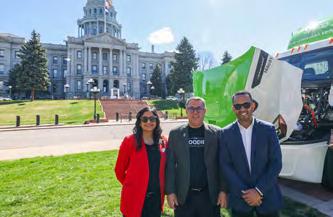

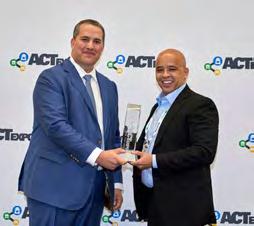
Our efforts to reduce fleet emissions are industry-leading, and our road to progress continues to unfold. Here’s how we drove these efforts forward in FY2024:
Our fleet is the largest direct contributor to Sysco’s GHG emissions, meaning it’s also one of our biggest opportunities to further our climate goals. In FY2024, we added 100 heavy-duty electric tractors to our North American fleets and an additional 10 at our Swedish subsidiary, Menigo. This brought us to a total of 131 EVs deployed across the U.S., Canada and Sweden. We plan to continue growing our global EV fleets in the coming years and recently piloted additional EVs in the U.K.
After unveiling our vision for Sysco’s Riverside, California, EV Hub in FY2023, we completed construction in FY2024. The Hub features 4 megawatt-hours (MWh) of battery storage and an additional 1.5 MW of solar power generation to sustainably accommodate the Riverside fleet’s growing energy demands. We see the site as a model for future fleet transformation projects and have begun developing similar initiatives to provide added charging capacity to key sites throughout the U.S.
To further reduce roadway emissions, we’re exploring bumper-to-bumper solutions that extend to the refrigerated trailers our trucks pull to keep products fresh. Our Riverside, California, site previously collaborated on a pilot of a hybrid electric trailer, which resulted in the deployment of five trailers to the site in FY2023. Building on that progress, we worked with the same partner to pilot a hybrid electric trailer in FY2024. FreshPoint Orlando also completed its pilot of an allelectric straight truck. While that pilot has not led to deployment, we are now piloting a similar vehicle at FreshPoint’s Central California site.
The type of fuel our vehicles use impacts their environmental performance, so we’ve begun seeking opportunities to source renewable fuels. In FY2024, we purchased renewable diesel for sites in Sweden and Oregon, as well as for several locations in California. The fuel is made from 100% sustainably sourced waste materials and emits up to 75% fewer GHG emissions than traditional diesel fuel. It is suitable for all diesel engines, approved by leading original equipment manufacturers and provides various performance benefits. Because it is clean burning, it can also significantly reduce a vehicle’s lifetime maintenance costs.

We know how important it is for the food industry to reduce GHG emissions. As we advocate for widespread action, we’re committed to reducing the direct climate impacts of Sysco’s global operations and fleets. In FY2024, we found new levers to set the stage for future Scope 1 and 2 reductions, from on-site energy optimization projects to opportunities to shift toward renewable electricity and fuels.
Our CY2019 Baseline GHG Footprint
Total footprint: 76M metric tons (MT) of carbon dioxide equivalent (CO2e)
Scope 1 (Direct) and 2 (Purchased Energy) Emissions
2.10%—1,620K MT CO2e
Scope 3 Indirect Value Chain Activities 97.9%—75,000K MT CO2e
Sysco is leveraging new digital tools to improve our data collection processes for our operations and suppliers and to develop an overall emissions baseline. View Calculating Our GHG Emissions to learn more.
• Scope 1 and 2 emissions.
• Primarily emitted through fleet transportation, refrigeration and purchased electricity.
• Within our direct control, giving us a high opportunity to drive reductions.
• Electrifying our global fleets to reduce transportation-based emissions and shifting toward renewable fuels.
• Investing in renewable electricity to power our operations.
• Optimizing shipping and delivery to reduce our miles on the road.
• Increasing energy efficiency in our buildings and transitioning to lower global warming potential refrigerants.
• Deployed an additional 110 vehicles in our global EV fleet and purchased 4.3 million gallons of renewable diesel for our fleets.1
• Signing a PPA that will avoid over 204,000 MT of CO2 emissions annually.
• Centralized our Inventory Management team and processes and enhanced collaboration and efficiency in our inbound supply chain.
• Completing on-site energy efficiency and conversion projects.
• Scope 3 emissions.
• Generated through our value chain activities, primarily through the production of the food and non-food products we sell.
• Outside our direct control, making it critical to address them by engaging our value chain partners.
• Enhancing visibility of our carbon footprint and supply chain activities and segmenting our supplier base to identify top emissions contributors.
• Educating suppliers on our company’s and customers’ sustainability expectations and providing them with resources and support.
• Embedding sustainability—including climate expectations—into our sourcing and merchandising practices.
• Launched new third-party partnerships to enhance Sysco’s global emissions tracking and enhance supply chain visibility.
• Engaged customers around climate and other sustainability topics at our Supplier Sustainability Summit.
• Embedded sustainability into our new Partnership Growth Management sourcing events and encouraged suppliers to achieve sustainability certifications so we can feature their offerings in our One Planet One Table assortment.
Sysco’s Scope 2 emissions stem from the electricity we purchase for our facilities. To sharply reduce them, we’ve set a goal to source 100% renewable electricity by 2030. In FY2023, we launched a new partnership in North America to support us in developing, implementing and financing a customized suite of renewable power solutions. Building on this progress, we signed a PPA in FY2024 that will provide Sysco with approximately 294,000 MWh of renewable energy per year. Through the PPA, we are partnering with a solar developer to construct a solar field in Oklahoma, which we expect will begin producing electricity by December 2027. We’re excited to launch this transformative project and plan to bring even more renewable energy to Sysco by signing additional PPAs in the years ahead.
In addition to signing a new PPA in FY2024, we continued to focus on multiphase projects to bring wind and solar energy to several international sites. In the U.K., we completed projects in Newhouse, Scotland, and Warrington, England, with projects in Redding and Edmonton, England, expected to be completed by FY2025. We are also near completion of a large solar project in Edmonton, Canada, with the Edmonton solar farm set to produce enough electricity to accommodate 75% of the site’s annual use.

100% renewable energy used by Sysco Ireland since 2023 100% of Sysco Ireland’s sales fleets are hybrids or EVs
Our new PPA will help us accelerate progress toward our climate commitments by significantly increasing renewable electricity at our sites.
By December 2027, the project is expected to produce: ~294K MWh of renewable energy per year, covering 40% of our annual electricity needs
That’s the annual equivalent of powering: 68K+ EVs 26K+ homes
By 2030, we aim to source 100% renewable electricity for our facilities, helping us to reduce our Scope 1 and 2 emissions by 27.5%
Our new PPA will bring us closer, enabling us to avoid over 204K MT CO2e each year

In our facilities, we aspire to use energy and other resources as efficiently as possible, with many of our sites undergoing heating, refrigeration and conversion processes in FY2024.
Overall, our approach to building enhancements aligns with FM Global standards and drives us to incorporate energysaving considerations into our facilities’ designs. This includes:
• Ensuring effective insulation.
• Reducing energy losses at building penetration points.
• Enhancing energy efficiency in major electrical components.
• Shifting to LED lighting equipped with occupancy sensors.
In addition to optimizing energy, we focus on responsibly managing water and waste. We also strive to design new facilities with sustainability in mind. View Waste and Water Stewardship to learn more.
We also have an established energy management program for nearly all North American foodservice sites, in which we analyze historical energy usage to provide monitoring, coaching, reporting and more. Our approach to new refrigeration projects includes an in-depth evaluation of various refrigerants that considers their energy consumption and global warming potential based on guidelines published by the California Air Resources Board and the U.S. EPA. To further reduce our environmental impact, we prioritize natural refrigerants that do not contain per- and polyfluoroalkyl substances (PFAS). 1
Sysco’s U.K. operations have achieved the following standards:
• ISO 14001 Environment management
• ISO 50001 Energy management
We seek opportunities to use reduced-carbon options when managing inbound shipments, such as intermodal and rail. Intermodal transportation combines multiple shipping methods, which typically add up to reduced GHG emissions. This often includes rail transportation, which can reduce GHG emissions by up to 75% compared to shipping by truck.1
In FY2024, we added a process in our annual carrier bids to evaluate opportunities to convert to intermodal and rail shipping. We’re exploring these opportunities based on various elements, such as supply chain feasibility and cost. We also piloted a third-party partnership that allows us to use real-time, lane-level data to calculate fuel reimbursements for all inbound shipments. By providing us with better fuel and emissions data, we
~20%
YOY increase in Canadian inbound volume moved via intermodal transportation in FY2024
hope the partnership will help us continue to improve our environmental performance. Overall, we achieved approximately a 20% increase in Canadian inbound volume moved via intermodal transportation compared to FY2023. In the U.S., our inbound volume moved via rail remained fairly flat, with approximately a 1% decrease year-over-year (YOY).
Products are constantly moving in and out of Sysco’s facilities. As they do, we work hard to streamline our trucks’ routes and make the most of every load. This enables us to deliver the products our customers need even faster, while reducing our fleet’s tailpipe emissions and use of fuel.
In FY2024, our Supply Chain Strategy and Transformation group supported initiatives to improve supply chain sustainability and mature Sysco’s omnichannel inventory management. We also centralized our Inventory Management Team and processes, such as appointment scheduling, to enhance collaboration and efficiency in our inbound supply chain. In addition, we increased the visibility of products throughout our supply chain to ensure compliance with section 204 of the U.S. Food and Drug Administration’s Food Safety Modernization Act, which requires additional traceability records for certain foods. Overall, these efforts helped us improve our on-time delivery and supplier fill rates compared to FY2023.

As with many other companies, Scope 3 emissions make up most of Sysco’s carbon footprint. These emissions are created through our value chain activities, both upstream and downstream, meaning they are not in our direct control. However, we can indirectly reduce them by innovating sustainable packaging and products and engaging our suppliers to set SBTs.
Our suppliers are critical partners in enhancing sustainability and building value. In FY2024, we expanded our Sustainability Suppliers and Products initiatives to deepen Sysco’s engagement with this group. Our broader Sustainability and Merchandising efforts help our suppliers advance strategic priorities, such as setting carbon reduction goals. Our FY2024 activities included:
• Educating suppliers on our company’s and customers’ sustainability expectations.
• Addressing the majority of environmental and social impacts that extend beyond Sysco.
• Increasing data attribution and enabling greater visibility into our supply chain.
• Working with suppliers to improve product quality and supply continuity, gain access to differentiated products and be first to market with innovative food industry solutions.
Our second annual Supplier Sustainability Summit included more than 500 attendees and was a key opportunity to engage suppliers around our sustainability focus areas. View Supplier Sustainability to learn more.
Sustainability isn’t an add-on to our sourcing practices; rather, it’s a core way we strengthen our supplier relationships and build value by doing what’s right. With our new Sustainability Sourcing team in place, we focused on further embedding sustainability into our sourcing work in FY2024.
For example, sustainability was woven into our Partnership Growth Management sourcing events, including those with dairy suppliers, where we captured information about their sustainability performance in addition to their business benefits. We also provided training and education to our sales, merchandising and business center teams to support them in championing sustainability through their roles. This included providing our sales and merchandising teams with sustainability collaterals for use in customer prospect meetings and business reviews.
Demand for agricultural products is high, and when it comes to sustainability, the way these items are produced makes all the difference.
Industrial farming practices can be water- and energy-intensive, with some relying heavily on pesticides that can diminish biodiversity and soil health. This poses risks to the food supply chain and the livelihoods of farmers as they strive to nurture healthy, productive land.
At Sysco, we know there’s a better way. Our Sustainable Agriculture program has long promoted responsible growing practices that balance environmental stewardship with our suppliers’ ability to meet our customers’ needs. In this landscape, Sysco is a trailblazer. We remain the only foodservice distribution company with a dedicated Sustainable Agriculture program, which we leverage to raise the bar on agricultural best practices.
By the end of 2025, expand Sysco’s Sustainable Agriculture program to include five fresh crops.
PROGRESS:
Exceeded our goal by including 17 fresh crops.

Now in its 20th year, Sysco’s Integrated Pest Management (IPM) program encourages responsible growing practices. This includes using pesticide and nutrient inputs responsibly, conserving energy and water, and minimizing waste. It applies to Sysco Brand canned and frozen foods, such as frozen fruits, vegetables and potatoes. As of FY2024, the program included more than 17,600 growers and 59 suppliers covering more than 1 million acres of field. Overall, growers who applied IPM principles reported avoiding 6.1 million pounds of pesticides throughout the growing season.

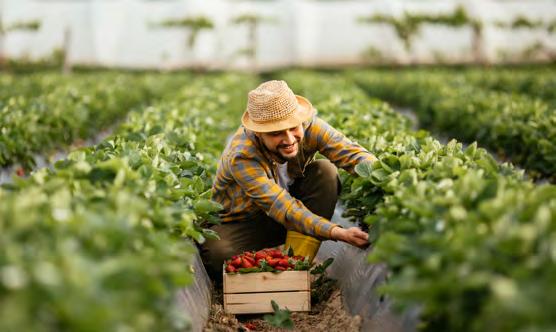
Often called “America’s salad bowl,” the Salinas Valley is home to several IPM participants who have embraced sustainable practices. One is a family business now in its fourth generation that provides a variety of leafy greens and other produce products.
The business currently generates approximately 75% of its energy demand on-site and began selling renewable energy certificates generated by its solar photovoltaic systems in 2023. This has enabled it to further invest in energy generation and operational efficiency while supporting other businesses in meeting their sustainability goals.
Nearby in the valley is a third-generation producer of salads, fresh blends and other produce items. At various sites, the producer leverages both solar and wind power. Additionally, three of its California facilities are TRUE Platinum Zero Waste Certified and more than 90% energy independent.
IPM’s 2023 Growing Season by the Numbers 1.0M+ acres covered across 59 suppliers and 17.6K+ growers
6.1M pounds of pesticides avoided using IPM strategies
3.5B+ pounds of crop material reused
~4.8B gallons of water conserved
61M kilowatt-hours of electricity from renewable energy sources
24% suppliers with GHG emissions reduction goals
After introducing it in FY2021 as a pilot program, Sysco formally launched its Sustainability Standard™ in FY2022. The third-party standard, which applies to Sysco Brand fresh crops, recognizes the sustainability performance of farming and processing operations and encourages continuous improvement.
Now in its third year, we are seeing the program’s early success with one mushroom producer already achieving full certification.
Other year-three suppliers are on track to achieve their certifications. Through the standard, we have far exceeded our 2025 sustainability goal to expand our Sustainable Agriculture program to include five fresh crops, with 17 crops covered under Sysco’s Sustainability Standard™ as of FY2024.
fresh crops covered by the Sustainable Food Group Sustainability Standard™ in FY2024
Teaming up with Certified Angus Beef (CAB)
Sysco has partnered with CAB, a brand recognized for its dedication to high-quality beef, to enhance animal welfare and promote sustainability in the beef industry. This partnership aims to deliver quality assurance training and certification to farmers and ranchers through 2025. With this training, farmers and ranchers will be equipped with the knowledge to uphold the highest standards of animal care. These efforts underscore our commitment to advancing responsible practices in the beef supply chain, addressing consumer concerns and reinforcing trust in the industry.
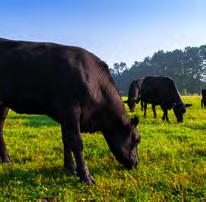
“Together, our efforts aim to further strengthen the livelihoods of family farmers and ranchers who are dedicated to producing high-quality beef and prioritizing the welfare of animals and the environment.”—Henry Fovargue, Sysco’s Vice President of Sustainability
In FY2024, FreshPoint added a new feature to its online ordering platform, MyFreshPoint.com, that uses icons to indicate local, organic and “Unusual But Usable” products. The feature will help empower customers to choose products that support sustainability, provide economic benefits to local communities and minimize waste.
Through our FreshPoint Local program, we seek opportunities to cultivate partnerships with small and mid-sized farmers and artisans in our local communities. In total, FreshPoint sites partnered with 586 local farms and artisans in the U.S. and Canada to purchase more than 202 million pounds of locally grown and made products in FY2024.
FreshPoint also strives to purchase from diverse suppliers and was proud to significantly increase its diverse supplier base in the Northern California region in FY2024. One local partner is a Hispanic berry farmer whose father began the family farm after moving from Mexico to California. The farm now spans 107 acres and recently provided berries for
FreshPoint’s Produce without Plastic initiative, which enables customers to support produce items packaged without plastic. View Packaging to learn more about our sustainable packaging initiatives throughout the fiscal year.
FY2024 FreshPoint Highlights
$19M+
investment with 30 diverse suppliers
202.3M+
pounds of product purchased from 586 local suppliers
Regenerative agriculture holds many promises for a better future, helping us improve food security in our supply chains, mitigate climate change and help restore the natural environment, and support economic stability for farming families.
In FY24, we accelerated our procurement of beef and other regenerative commodities such as rice and flour. We are actively working with our suppliers to connect demand of these regenerative and reduced carbon products with supply to reduce Scope 3 emissions throughout the chain and improve biodiversity outcomes.
This holistic land management approach intentionally enhances natural resources and brings farming into harmony with the natural environment. Focus areas include:
• Livestock responsibility
• Soil health
• Water quality
• Crop diversity
• Biodiversity
• Farmer education
As Sysco explores the regenerative agricultural space, we are working with our suppliers to expand best practices, education and engagement. Key initiatives include:
Leveraging a carbon accounting platform to precisely measure agricultural emissions and identify reduction strategies. The platform will help us assess and minimize our supply chain emissions and give customers the information needed to choose reduced-carbon products. This is an important part of the regenerative agriculture journey, as a healthier climate will support more secure food supply chains over the long term.
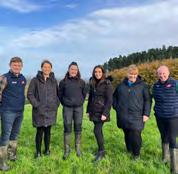
Sysco Ireland’s Future of Farming project (above), in which we are partnering with a seventh-generation beef farmer as she tests regenerative agriculture techniques. During our five-year collaboration, she will capture data through a recognized third party and document her journey on social media and syscoireland.com.
Sysco’s Supplier Sustainability Summit, which also included regenerative agriculture as one of its featured topics. We plan to continue engaging our suppliers to further promote and evolve these practices moving forward.
Sysco’s operations span multiple continents, so when we work together to minimize waste, the benefits add up on a larger scale.
We focus on opportunities to enhance circularity through recycling, upcycling, composting and other initiatives across our sites. As a global foodservice company, we also strive to donate or quickly resell short-dated products to help nourish communities rather than contributing to food waste.
We have an extensive landfill diversion program with a goal to divert 90% of waste—including food from landfills—by 2025. We have made progress on our waste goal, improving diversion from 67% to 83% from FY2023 to June 2024 while reducing the costs of waste haulage. We attribute this progress, in part, to a shift in strategy in which we began collaborating with our recycling partner to target our efforts toward 15 high-priority sites. This has enabled us to increase overall landfill diversion rates more quickly, putting us on track to achieve our goal in FY2025.
As we zeroed in on key sites, we equipped them with new organics programs related to de-packaging, composting, anaerobic digestion, biofuel, animal feed and more. We also leveraged more accurate data tracking for reuse programs, such as our initiative to recycle
By the end of 2025, divert 90% of waste, including food, from landfills.
Improved diversion from 67% to 83% from FY2023 to June 2024 while reducing the costs of waste haulage.
used pallets. At four sites, we launched a new program in which participants could earn rebates by properly recycling premium-quality shrink wrap bales. Our sites received a total of over $40,000 in rebates through the program, which we hope to continue and expand in the future.
Our direct operations are not highly water intensive; however, we emphasize water stewardship throughout our value chain. Most of our operational water consumption is used for product refrigeration, washing vehicles and landscaping our sites. In these areas, we continue to identify and implement water-saving opportunities, such as using cooling processes to recycle the water we use for condensers at five U.S. locations.
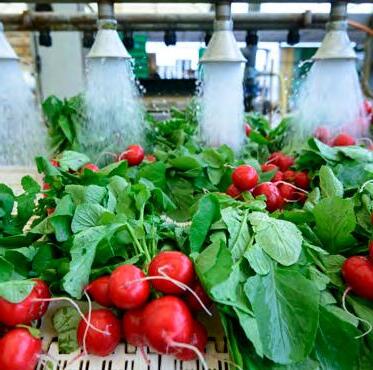
Sysco Canada is committed to paving the way for sustainable transformation. To support this, the business presented its second-annual Save Award, with a prize of $10,000, in FY2024. The award recognizes leaders for their commitment, innovation and perseverance in reducing food waste. It was presented to the site that achieved the greatest reduction in shrink wrap usage compared to FY2023.
The region also received external recognition, with Globe and Mail naming it Canada’s Greenest Employer and Wendy’s naming Sysco Canada, as well as our SYGMA and Broadline business groups, as the Good Done Right Supplier of the Year. These awards highlight a dedication to embedding sustainability into day-to-day practices and focusing on doing business the right way. One example is the region’s Calgary facility, which supports environmental progress through its smart, sustainable design. The facility boasts a stormwater reuse system, a roof prepared for future solar installation, a heat recovery system, LED lighting and more.
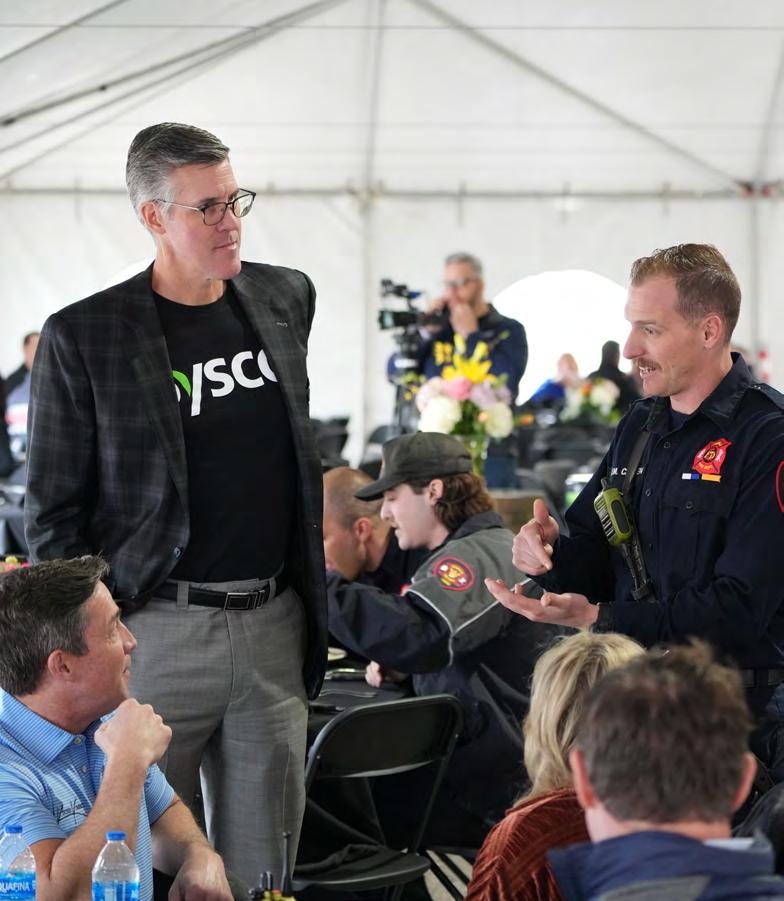
Our strong corporate governance provides a foundation for success. It’s rooted in a simple set of principles: Act ethically. Act responsibly. Do the right thing.
Setting the Table for Progress
• 50% gender and racial or ethnic diversity on our Board of Directors.
• Appointed Sysco CEO Kevin Hourican as the Chair of our Board of Directors
• Launched a new Global Code of Conduct (Code) and Supplier Code of Conduct (SCOC) and conducted updated Code training for all colleagues.
• Advocated for local, state and national electric vehicle (EV) infrastructure, supporting Sysco in adding 110 EVs to our global fleets.
Our Board of Directors oversees our efforts to integrate sustainability into our core strategy, helping us build a more adaptable and resilient business.
Our Board helps us deliver for our shareholders and other stakeholders worldwide by providing oversight and guidance as we work to address their evolving needs. Our Board Committees include:
• Audit Committee
• Compensation & Leadership Development Committee
• Corporate Governance & Nominating Committee (the Governance Committee)
• Sustainability Committee
• Technology Committee
• Executive Committee
In FY2024, our Board appointed Kevin Hourican as Chair of the Board and CEO. He succeeded Edward D. Shirley, who stepped down from the position due to personal health reasons.
The Board also appointed Larry Glasscock as the Lead Independent Director. In this role he will serve as primary liaison between the independent directors and the CEO. Accordingly, he stepped down as Chair of the Corporate Governance & Nominating Committee and was replaced by independent director John Hinshaw.
Additionally, the Board welcomed new member Francesca DeBiase, former Executive Vice President and Chief Global Supply Chain Officer at McDonald’s Corporation, who also serves on the Board’s Audit and Sustainability Committees. Sysco’s Director Tenure policy provides that no director can serve for more than 15 years.
Every year, the Board conducts a self-evaluation to determine whether it is functioning effectively. Through this process, the Board’s Chair, Lead Independent Director and Governance Committee Chair lead a discussion of the Board’s performance during the executive sessions. In addition, each Board committee conducts a self-evaluation of its performance focused on the committee’s key responsibilities. As part of the evaluation process, each director completes a committee self-evaluation questionnaire developed by the Governance Committee. The committees all review feedback from their self-evaluations, as does the full Board. Key learnings from the Board and committee self-evaluations play an important role in informing the Board’s approach to refreshment and succession planning.
As a matter of practice, our Board looks for diversity in nominees in terms of race, gender, ethnicity, cultural background, age, geographic origin, education and professional and life experiences. In FY2024, four of our Board nominees were women—one of whom was African American.
FY2024 Board of Directors Diversity
The Board’s self-evaluation process includes periodic 360-degree performance reviews, which involve a confidential evaluation of a director’s performance by other directors, senior management and certain independent, third-party firms.
Sysco’s Board-level Sustainability Committee meets three times a year, with each meeting focused on one of the company’s three pillars of people, products and planet. The Sustainability Committee reviews and acts in an advisory capacity to the Board and management with respect to policies and strategies that affect Sysco’s role as a socially responsible organization. The Sustainability Committee’s responsibilities include:
• Evaluating and providing input on Sysco’s sustainability strategy and progress toward Sysco’s sustainability goals.
• Ensuring Sysco’s alignment and compliance with global sustainability-related regulatory and reporting requirements.
- Reviewing sustainability activities like philanthropic giving, agricultural programs, animal welfare and warehouse and transportation initiatives.
- Collaborating with the Audit Committee to assess climate-related business risks.
• Providing an annual sustainability update to the full Board of Directors.

As the Board Chairman of Sysco’s Sustainability Committee since 2016, I’m proud of the progress the company continues to make in this important area. Sysco is the global leader in food service distribution, and it is our responsibility to ensure we do our part to have a positive impact on the planet and its people. For example, in FY2024 the company advanced its utilization of renewable diesel to 4.3 million gallons, which equates to removing 10,000 passenger vehicles off the road. The company is also making great strides toward its 2025 waste diversion and sustainable agriculture goals.
These and many more examples are why the Committee is fully supportive of this important work as we continue to advance our sustainability goals and grow the business responsibly.”
DAN BRUTTO, Sysco Sustainability Committee Board Chair
View our FY2024 Proxy Statement to learn more about our Board structure and practices.

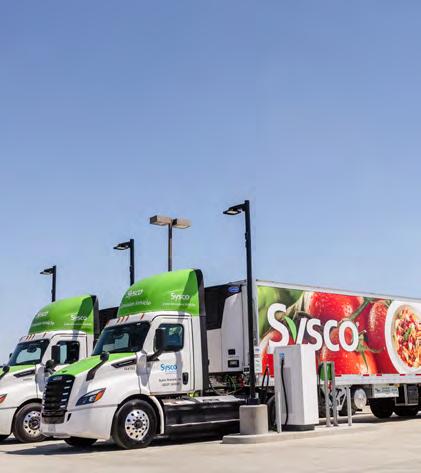
Our efforts to identify and act on existing and emerging risks ensure that we can continue to serve our purpose long into the future.
Sysco’s Board oversees the ERM process to ensure it is consistent with the company’s short- and long-term goals. The Board also chooses specific enterprise risks to monitor, such as those related to competitive threats, senior leadership succession, cybersecurity and business continuity.
Our Executive Leadership Team identifies, manages and mitigates enterprise risks and reports directly to the Board and Audit Committee. This includes:
• Conducting an annual review of our enterprise risks with the Board.
• Discussing risk management processes and risk-mitigation resources.
• Developing risk mitigation plans to lower Sysco’s risk exposure.
Sysco’s senior management tracks all risk-related information and monitors the implementation of our risk mitigation plans and reporting through an established Risk Committee that meets regularly to carry out these duties. The Board’s committees also oversee our ERM processes within their respective areas of oversight and authority.

Our approach to ERM prioritizes a culture of integrity and compliance at all levels of the organization. A key tool in cultivating this environment is our Global Code of Conduct (the Code). The Code applies to Sysco leaders and colleagues, including directors and officers, extending to our Chief Executive Officer, Chief Financial Officer and Chief Accounting Officer. It represents our commitment to conducting our business with the highest standards of moral and ethical behavior in accordance with our values: rooted in integrity, committed to inclusion, drive together, define excellence and grow responsibly.
Our Governance Committee periodically reviews the Code and requires every Sysco colleague to strictly adhere to all laws and regulations applicable to our business. We also require colleagues to report any violations or suspected violations of the Code. View our FY2024 Proxy Statement to learn more. Topics covered in our FY2024 training campaign included:
• Gifts and entertainment
• Anti-bribery
• Avoiding conflicts of interest
• Reporting misconduct
We supported the rollout of our updated Code with an updated global training campaign for all Sysco colleagues in FY2024. By ensuring that all colleagues are aware of our expectations, we aim to minimize our company’s reputational and financial risks. We regularly evaluate the topics covered in our training campaign for relevance and may adjust them in future campaigns based on the company’s risk profile and evolving business needs.
Sysco published a reimagined Code and SCOC in FY2024. View the Code for a listing of priority topics.
Technology drives our global operations, from our corporate offices to our warehouses to our delivery routes. We take thorough and diligent steps to secure the technology we rely upon and ensure we comply with leading cybersecurity standards.
Sysco’s digital team guides our approach to data privacy and cybersecurity management and risk mitigation. Our Chief Information and Digital Officer and Chief Information Security Officer oversee this approach, with ultimate oversight from our Board. Two of our Board directors are highly experienced in cybersecurity matters with experience in information technology systems and related opportunities and risks. We leverage their expertise to protect our enterprise and embrace the technologies needed to facilitate responsible growth.
Our cybersecurity measures include:
• Conducting ongoing risk assessment with a twice-annual formal assessment with leadership review.
• Auditing control procedures, spot-testing controls with both internal and external teams and conducting third-party due diligence.
• Holding annual mandatory cybersecurity training for all Sysco colleagues with additional modules required for colleagues with certain privileges and responsibilities.
• Implementing strict controls on records retention in accordance with requirements established and approved through our legal department.
• Preparing incident response procedures to manage any breaches of confidential information.
In FY2024, we continued to mature and improve our cybersecurity programs, including developing tools to reduce risk and investing in compliance capabilities. We also developed an expanded set of cybersecurity metrics to measure our programs’ effectiveness, with plans to put these into practice in FY2025. Ultimately, our goal is for cybersecurity programs to exceed industry benchmarks as measured by the National Institute of Standards and Technology’s Cybersecurity Framework.

Delivering on our goals as a foodservice leader and sustainability innovator requires sound public policy.
Sysco promotes and protects our company’s interests by directly lobbying government officials on a range of issues. These include:
• Agriculture
• Animal Welfare
• Energy and the Environment
• Food Safety
• Healthcare
• Immigration
• Labor
• Nutrition
• Occupational Safety and Licensing
• Product Labeling
• Taxes
• Trade
• Transportation
• Workers’ Compensation
We comply with all U.S. federal and state lobbying laws, which require reporting on lobbying activity. For FY2024, Sysco reported U.S. federal lobbying expenditures of $400,000 in reports filed with the Clerk of the U.S. House of Representatives and the Secretary of the U.S. Senate. In jurisdictions outside of the U.S., Sysco complies with all applicable lobbying legislation.


Electrifying Sysco’s fleet is key in our work to reduce greenhouse gas emissions. To support EV-friendly infrastructure, our Government Relations team engaged local, state and national policymakers in the U.S., Great Britain and Canada throughout FY2024. We also worked with U.S. public utilities and utility associations to strengthen the electric grid to support EV use. This helped us add 110 EVs to our global fleets during the fiscal year. View Decarbonizing Our Global Fleets to learn more about our fleet electrification initiatives.

Sysco works with an array of industries and organizations with similar business objectives and goals. To help achieve legislative and regulatory priorities on issues important to our business, we maintain memberships in various industry trade associations. We don’t necessarily agree with every position these organizations take; however, we have found that providing our input is a constructive way to influence policy outcomes. View our website for a list of our memberships and dues.
We engage in the political process by donating to candidates and campaigns that support Sysco’s business objectives. The Sysco Corporation Public Policy Committee determines the level of contributions and involvement. The committee is a multifunctional group that consists of members from Sysco’s Executive Leadership, Government Relations, Legal, Investor Relations and Communications teams, along with other relevant functional leaders.
The Sysco Corporation Good Government Committee, Inc. (Sysco PAC) was established to allow eligible colleagues to engage in the political process. A separate board of directors comprised of leaders from our Global Support Center, U.S. Foodservice and Specialty businesses governs the Sysco PAC. The PAC makes contributions to U.S. federal, state and local candidates in accordance with election laws and regulations. Membership in the Sysco PAC is strictly voluntary and can be discontinued at any time.
The Sysco PAC is regulated by the Federal Election Commission (FEC) and files reports, as required, with the FEC and state election commissions. View the FEC’s website to find our publicly available reports. You can also view our website for more information on Sysco’s government relations and public policy engagement approach.


Please follow the links below for additional information about our sustainability efforts and related topics:
Business Overview: p. 3, 2024 Annual Report
Reporting Segments: p. 3, 2024 Annual Report
Customers and Products: p. 4, 2024 Annual Report
Human Capital Resources: p. 5, 2024 Annual Report
Board Composition and Accountability: p. 10, 2024 Proxy Statement
Board Committees: p. 13, 2024 Proxy Statement
Risk Oversight: p. 17, 2024 Proxy Statement
Global Code of Conduct: p. 38, 2024 Proxy Statement
Reporting a Concern or Violation: p. 38, 2024 Proxy Statement
Compensation Discussion and Analysis: p. 49, 2024 Proxy Statement
Global Code of Conduct
Supplier Code of Conduct
Board-Level Sustainability Committee
CDP Climate Change 2023
CDP Water 2023
Palm Oil ACOP CY2023
Forests Report May 2021
Sysco Seafood Sustainability Report
Information in this report primarily reflects the sustainability performance of Sysco Corporation in the United States (U.S.) and Canada during FY2024.
This report has been published in accordance with the Global Reporting Index (GRI), and our 2024 GRI Index is available for download on our website. Additionally, this report includes our third Sustainability Accounting Standards Board (SASB) Index and annual updates on our global impact and sustainability goals and progress. Please see our Annual Report and filings with the Securities and Exchange Commission (SEC) for more information on Sysco’s operations and business performance.
We value feedback from all our stakeholders. For questions or comments concerning this report, please contact the Sysco Sustainability team at sustainability@sysco.com.
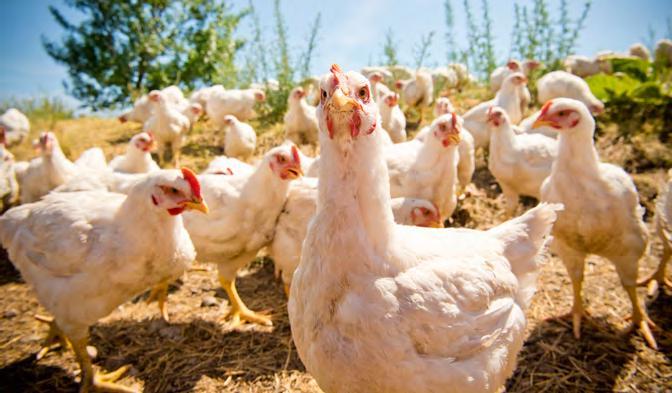

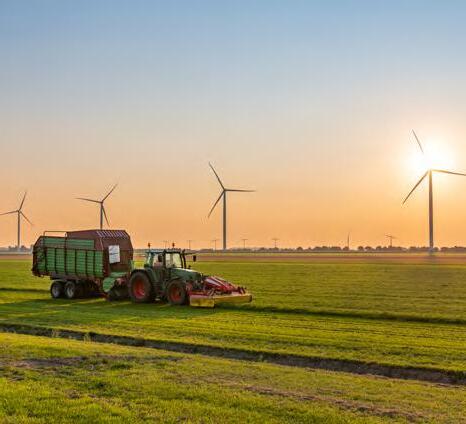
Sysco’s sustainability strategy is rooted in the findings of our 2021 materiality assessment, which pinpointed the most critical environmental, social and governance (ESG) topics according to our stakeholders’ perspectives and decision-making priorities. To ensure ongoing relevance and alignment with our global enterprise, we conducted a materiality refresh in FY2022. This update was designed to confirm the assessment’s continued accuracy and relevance and to provide a more comprehensive reflection of our worldwide operations. Building on these efforts and in line with new regulatory requirements, we began completing Sysco’s first double materiality assessment in FY2024, which we aim to complete in FY2025.
To arrive at our existing ESG priority topics, we completed the following steps as part of our previous ESG materiality assessment and refresh:
• Benchmarking Sysco’s peers to analyze their ESG priorities and practices and gain insights into emerging best practices and trends.
• Completing a desk-based review of key stakeholders, including global investors, nongovernmental organizations (NGOs), customers, suppliers and retail partners, to capture their evolving priorities and expectations.
• Examining the criteria and expectations set forth by prominent ESG rating agencies and ranking organizations to ensure alignment between our practices and global sustainability standards.
• Fostering internal engagement by organizing a collaborative workshop in which we encouraged diverse perspectives on ESG issues relevant to our operations.
• Conducting in-depth interviews with Sysco’s senior leaders to gather strategic insights and ensure alignment with our overarching business and sustainability goals.

Our approach enabled us to identify and prioritize the most significant ESG topics affecting our business and stakeholders. They include:
• Climate change
• Sustainable and responsible sourcing
• Local community engagement
• Diversity and inclusion
• Waste (including food waste)
• Human rights
• Packaging
• Animal welfare
• Employee health and well-being
• Health and nutrition
• Traceability and transparency
• Nature and biodiversity

In FY2024, we initiated our first double materiality assessment to align with the new European Sustainability Reporting Standards (ESRS) under the European Union’s Corporate Sustainability Reporting Directive (CSRD). Through the assessment, we are examining Sysco’s environmental and social impact and the influence of sustainability-related issues on our company’s financial health. The assessment incorporates:
• A value chain analysis, as proposed by the European Financial Reporting Advisory Group (EFRAG).
• Insights from our 2022 materiality refresh and existing enterprise risk management (ERM) framework.
Our dedicated ERM and Business Continuity team is supporting us by ensuring seamless alignment between the double materiality assessment results and our broader ERM objectives. Our aim is to complete the assessment in FY2025 and communicate the results through our FY2025 Sustainability Report. This initiative will reinforce our commitment to greater transparency and accountability across our business activities. The steps we are taking to complete this process include:
• Conducting preliminary research to assess our business model and strategic objectives, consolidate our existing disclosures and identify relevant sustainability topics.
• Completing the assessment by identifying key ESG impacts, risks and opportunities and using a scoring process to evaluate them in terms of impact and financial materiality.
• Verifying and aligning the assessment results by engaging with internal stakeholders, including working with Sysco’s management to validate our findings and finalize our updated ESG material topics.
As regulatory demands change throughout our operational footprint, we will continue to evolve our materiality approach to ensure that we stay in line with relevant requirements and best practices.
We regularly seek opportunities to engage with our stakeholders so we can learn how Sysco can better serve their evolving needs. Our engagement process includes:
STAKEHOLDER GROUP KEY ENGAGEMENT TACTICS
Colleagues
• Sysco Speaks, our global, companywide annual engagement survey
• The Dish News, our intranet site
• Sysco To-Go, an internal app of news and resources for Sysco colleagues
• Social media and other channels
View Colleague Engagement to learn more about how we stay connected with our global colleagues.
Customers
• Sales consultant interactions
• Customer service surveys
• Online communications and strategic reviews
• Other dialogue and partnership channels
View Products to learn more about how we innovate products and solutions to meet our customers’ needs.
Investors
• Financial reporting
• Annual shareholder meetings
• Investor conference presentations
• Investor meetings
• CDP and other ratings disclosures
View our website to learn more about how we engage with the investment community.
STAKEHOLDER GROUP KEY ENGAGEMENT TACTICS
Regulators
• Regular engagement with relevant governmental agencies in the jurisdictions where we operate
View Government Relations to learn more about how we engage with regulators.
Suppliers
• Surveys
• Regular business reviews
• Joint business planning
• Supplier partnership programs, such as the Sustainable Agriculture program
• Annual Supplier Sustainability summits
View Supplier Sustainability to learn more about our supplier engagement touchpoints and programs.
NGOs
Peers
• Key partnerships, including with World Wildlife Fund, the Global Food Safety Initiative and the Center for Food Integrity
View Global Good and Responsible Sourcing to learn more about our community and industry partnerships.
• Participating in industry groups to advance best practices and legislative improvements
View Trade Association Engagement to learn more about how we engage with our industry.

Being transparent about our sustainability performance is a critical component in taking accountability and achieving our goals. We expanded our third-party assurance beyond environmental verification in FY2022 and have continued to do so each year.
We engaged EY to perform limited assurance over various FY2024 ESG metrics, including:
• Charitable giving—Meal donations
• Charitable giving—Monetary donations
• Certified sourcing—Percentage of coffee pounds sold
• Certified sourcing—Percentage of paper towel, paper napkin, bath and facial tissue case volume sold
• Supplier diversity—spend with certified diverse businesses

For questions or comments concerning this report, please contact the Sysco Sustainability team at sustainability@sysco.com ©2024 Sysco Corporation. All Rights Reserved.